

Essay on Mahatma Gandhi [100, 150, 200, 300, 500 Words]
Essay on Mahatma Gandhi in English: In this article, you are going to read short and long essays on Mahatma Gandhi in English (100, 150, 200-250, 300, and 500 words). This article will be also helpful for you If you are looking for a speech on Mahatma Gandhi or Paragraph on Mahatma Gandhi in English. We’ve written this article for students of all classes (nursery to class 12). So, let’s get started.
Table of Contents
Short Essay on Mahatma Gandhi 100 Words
Mahatma Gandhi was one of the greatest leaders of our country. He was born in Porbandar, India, on October 2, 1869. His father Karamchand Gandhi was the Dewan and his mother Putlibai was a pious lady. Gandhiji went to England to become a barrister. In 1893 he went to South Africa and worked for the rights of our people.
He returned to India in 1915 and joined the freedom struggle. He started many political movements like Non-cooperation movement, Salt Satyagraha, Quit India Movement to fight against the British. Gandhiji worked for the ending of the caste system and the establishment of Hindu-Muslim unity. He was killed by Nathuram Godse On January 30, 1948.
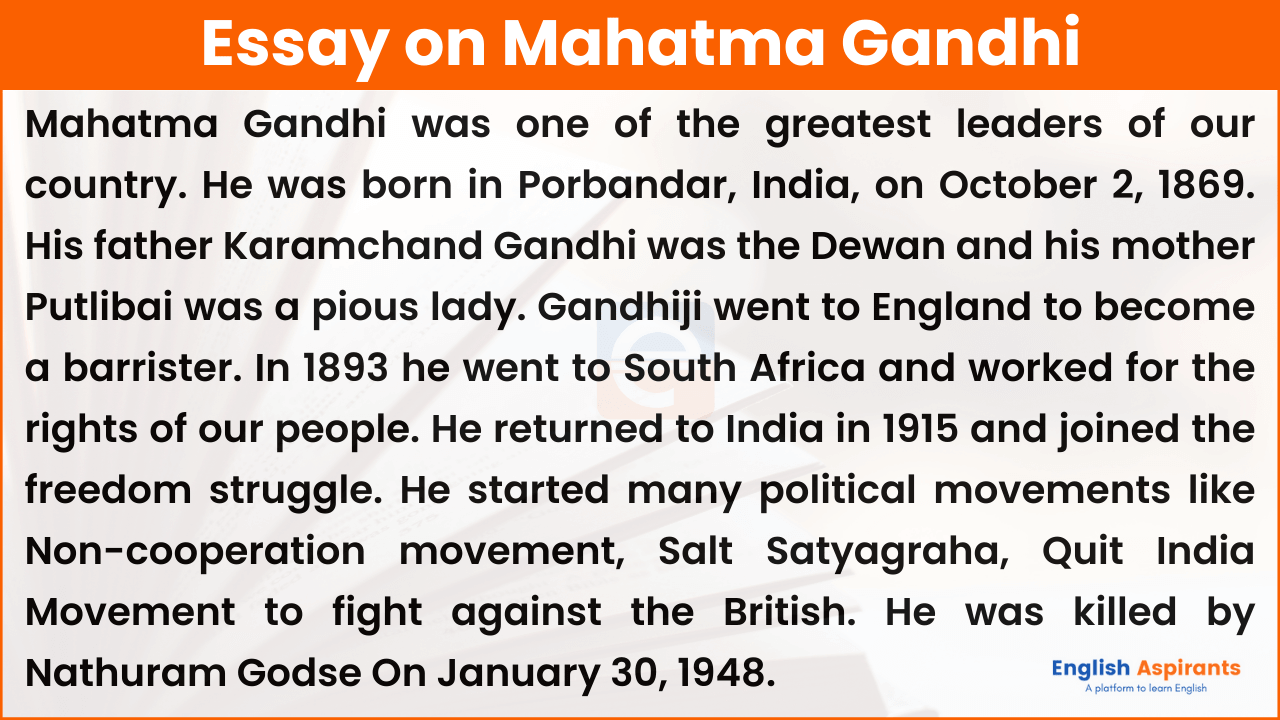
Mahatma Gandhi Essay in English 150 Words
Mahatma Gandhi was a great leader. His full name was Mohandas and Gandhi. He was born on October 2, 1869 at Porbandar. His father was a Diwan. He was an average student. He went to England and returned as a barrister.
In South Africa, Gandhiji saw the bad condition of the Indians. There he raised his voice against it and organised a movement.
In India, he started the non-cooperation and Satyagraha movements to fight against the British Government. He went to jail many times. He wanted Hindu-Muslim unity. In 1947, he got freedom for us.
Gandhiji was a great social reformer. He worked for Dalits and lower-class people. He lived a very simple life. He wanted peace. He believed in Ahimsa.
On January 30, 1948, he was shot dead. We call him ‘Bapu’ out of love and respect. He is the Father of the Nation.
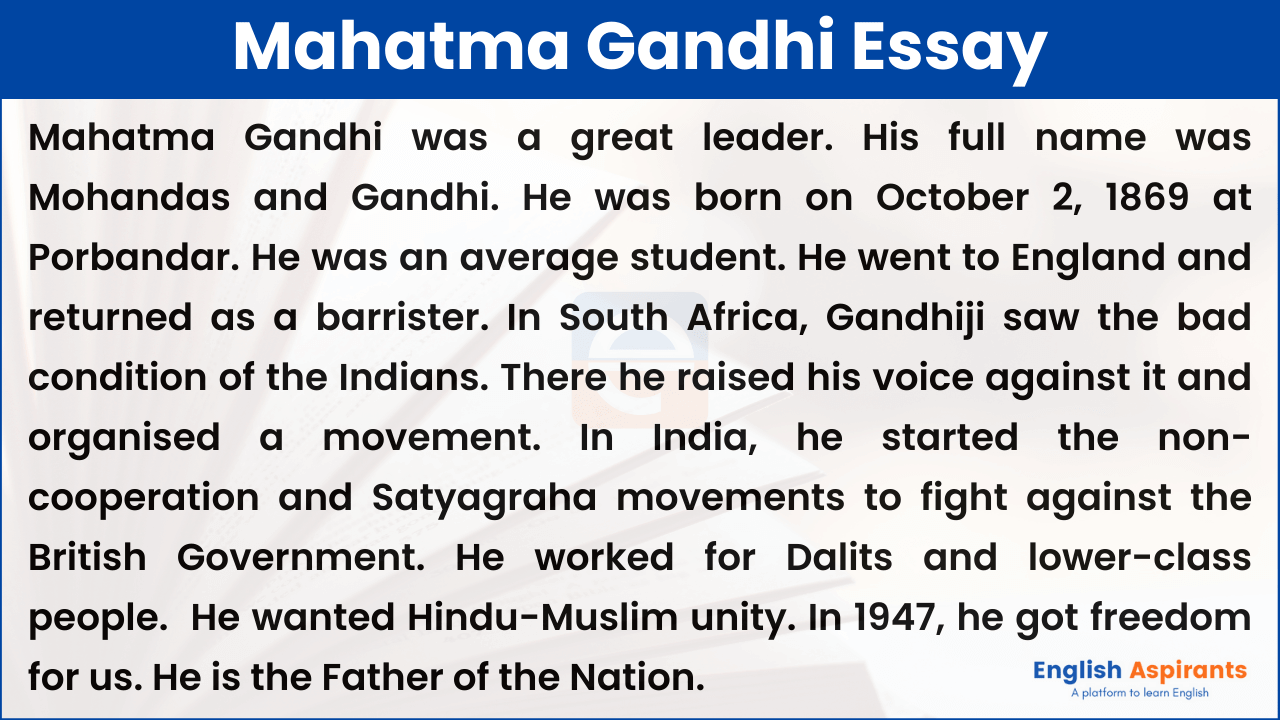
Also Read: 10 Lines on Mahatma Gandhi
Essay on Mahatma Gandhi 200-250 Words
Mohandas Karamchand Gandhi, popularly known as Mahatma Gandhi was an Indian lawyer, freedom activist, and politician. Gandhiji was born on October 2, 1869 at Porbandar, Gujarat. His father Karamchand Gandhi was the Chief Minister (diwan) of Porbandar state. His mother Putlibai was a religious woman.
He went to England to study law at the age of 18 years. After his return to India, he started a practice as a lawyer in the Bombay High Court. He went to South Africa and started practicing law. There he protested against the injustice and harsh treatment of the white people towards the native Africans and Indians.
He returned to India in 1915 and started to take interest in politics. Mahatma Gandhi used the ideals of truth and non-violence as weapons to fight against British colonial rule. He worked for the upliftment of Harijans. He fought against untouchability and worked for Hindu-Muslim unity.
Through his freedom movements like Non-cooperation movement, Khilafat movement, and civil disobedience movement he fought for freedom against the British imperialists. 1942, he launched the Quit India movement to end the British rule. At last, India got freedom in 1947 at his initiative.
People affectionately call him ‘Bapu’ and the ‘Father of the Nation’. He was shot dead in 1948 by the Hindu fanatic Nathuram Godse. Gandhiji’s life is a true inspiration for all of us.
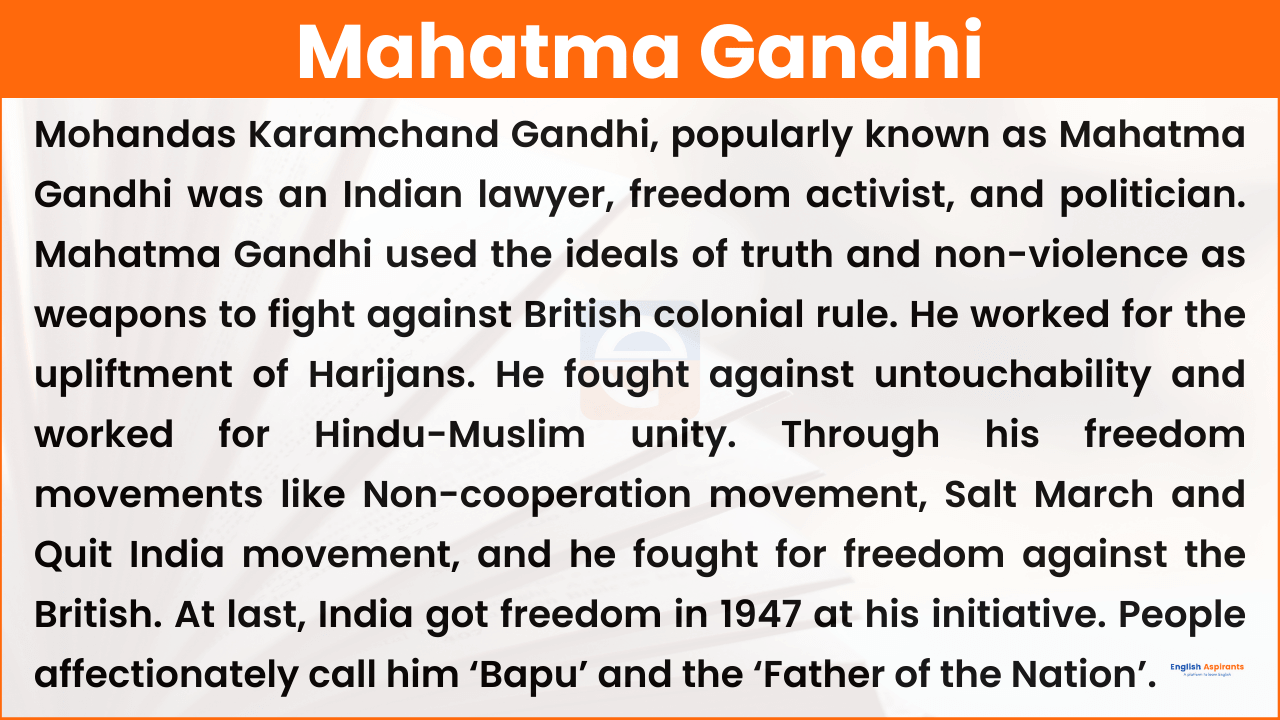
Mahatma Gandhi Essay in English 300 Words
Mahatma Gandhi was born at Porbandar in Gujarat on 2nd October, 1869. His father was the Diwan of the State. His name was Karam Chand Gandhi. Mahatma Gandhi’s full name was Mohan Das Karamchand Gandhi. His mother’s name was Putali Bai. Mahatma Gandhi went to school first at Porbandar then at Rajkot. Even as a child, Mahatma never told a lie. He passed his Matric examination at the age of 18.
Mohan Das was married to Kasturba at the age of thirteen. Mahatma Gandhi was sent to England to study law and became a Barrister. He lived a very simple life even in England. After getting his law degree, he returned to India.
Mr. Gandhi started his law practice. He went to South Africa in the course of a law suit. He saw the condition of the Indians living there. They were treated very badly by the white men. They were not allowed to travel in 1st class on the trains, also not allowed to enter certain localities, clubs, and so on. Once when Gandhiji was travelling in the 1st class compartment of the train, he was beaten and thrown out of the train. Then Mahatma decided to unite all Indians and started the Non-violence and Satyagrah Movement. In no time, the Movement picked up.
Mahatma Gandhi returned to India and joined Indian National Congress. He started the Non-violence, Non-cooperation Movements here also. He travelled all over India, especially the rural India to see the conditions of the poor.
Mahatma Gandhi started Satyagrah Movement to oppose the Rowlatt Act and there was the shoot-out at Jalian-Wala-Bagh. The Act was drawn after many people were killed. He then started the Salt Satyagraha and Quit India Movements. And finally, Gandhiji won freedom for us. India became free on 15th August, 1947. He is called as “Father of the Nation”. Unfortunately, Gandhiji was shot on 30 January 1948 by a Hindu extremist Nathuram Godse.
Also Read: Gandhi Jayanti Speech 10 Lines
Mahatma Gandhi Essay in English 500 Words
Introduction:.
Mohandas Karamchand Gandhi, popularly known as Mahatma Gandhi was a politician, social activist, writer, and leader of the Indian national movement. He is a figure known all over the world. His name is a household word in India, rather, in all the world round. His creed of non-violence has placed him on the same par with Buddha, Sri Chaitanya, and Jesus Christ.
Family & Education:
Mahatma Gandhi was born in the small town of Porbandar in the Kathiwad state on October 2, 1869. His father Karamchand Gandhi was the prime minister of Rajkot State and his mother Putlibai was a pious lady. Her influence shaped the future life of Mahatma Gandhi.
He was sent to school at a very early age, but he was not a very bright student. After his Matriculation Examination, he went to England to study law and returned home as a barrister. He began to practice law in Bombay but he was not very successful.
Life in South Africa:
In 1893 Gandhiji went to South Africa in connection with a case. He found his own countrymen treated with contempt by the whites. Gandhiji started satyagraha against this color hated. It was a non-violent protest, yet hundreds were beaten up and thousands were sent to jail. But Gandhiji did not buzz an inch from his faith in truth and non-violence and at last, he succeeded in his mission. He was awarded the title of Mahatma.
Fight for India’s Independence:
In 1915 Gandhiji came back to India after twenty long years in South Africa. He joined the Indian National congress and championed the cause of India’s freedom movement. He asked people to unite for the cause of freedom. He used the weapons of truth and non-violence to fight against the mighty British.
The horrible massacre at Jalianwalabag in Punjab touched him and he resolved to face the brute force of the British Government with moral force. In 1920 he launched the Non-cooperation movement to oppose British rule in India.
He led the famous Dandi March on 12th March 1930. This march was meant to break the salt law. And as a result of this, the British rule in India had already started shaking and he had to go to London for a Round Table Conference in 1931. But this Conference proved abortive and the country was about to give a death blow to the foreign rule.
In 1942 Gandhiji launched his final bout for freedom. He started the ‘Quit India’ movement. At last, the British Government had to quit India in 1947, and India was declared a free country on August 15, 1947.
Social Works:
Mahatma Gandhi was a social activist who fought against the evils of society. He found the Satyagraha Ashram on the banks of the Sabarmati river in Gujarat. He preached against untouchability and worked for Hindu-Muslim unity. He fought tirelessly for the rights of Harijans.
Conclusion:
Mahatma Gandhi, the father of the nation was a generous, god-loving, and peace-loving person. But unfortunately, he was assassinated by Nathuram Godse on 30th January 1948 at the age of 78. To commemorate Gandhiji’s birth anniversary Gandhi Jayanti is celebrated every year on October 2. Gandhiji’s teachings and ideologies will continue to enlighten and encourage us in the future.
Read More: 1. Essay on Swami Vivekananda 2. Essay on Subhash Chandra Bose 3. Essay on Mother Teresa 4. Essay on APJ Abdul Kalam 5. Essay on Sarvepalli Radhakrishnan
Related Posts
Apj abdul kalam essay in english | 100, 200, 300, 500 words, blood donation essay in english | 150, 200, 300 words, my mother essay in english 10 lines [5 sets], essay on mother teresa in english for students [300 words], leave a comment cancel reply.
Your email address will not be published. Required fields are marked *
Save my name, email, and website in this browser for the next time I comment.

Improve your Grades
Paragraph On Mahatma Gandhi 100, 150, 200, 250 to 300 Words for Kids, Students and Children
September 10, 2024 by Prasanna
Paragraph On Mahatma Gandhi in English: Mohandas Karamchand Gandhi, popularly known as ‘Mahatma Gandhi’, was one of the greatest freedom fighters that the world has ever seen. It was a great honor of the country people e to have been the birthplace and workplace of Mahatma Gandhi. He was a self-sacrificing hero who rose to the occasion of freeing the country from the grasp of the British. He began several movements like the Quit India Movement as well as the Satyagraha movement. Read on to find more about Mahatma Gandhi Passage.
You can read more Paragraph Writing about articles, events, people, sports, technology many more.
Paragraph On Mahatma Gandhi For 1, 2, 3, 4, 5, 6, 7, 8, 9, 10, 11 And 12 Students
Short paragraph on mahatma gandhi – 100 words for class 1,2,3 kids.
Born in the quiet place of Gujarat, Mahatma Gandhi went onto become a freedom fighter and fought vehemently to free India of the British Rule. He believed in non-violence and considered peace to be of foremost importance in case of winning the struggle. He started his life as a lawyer. He came to India to pursue the same and could not make a good living out of the skill that he had acquitted. He failed to practice law properly here and as a result of that shifted to South Africa. He started a family there. Young Gandhi is a vivid reflection of the values his mother had taught him.
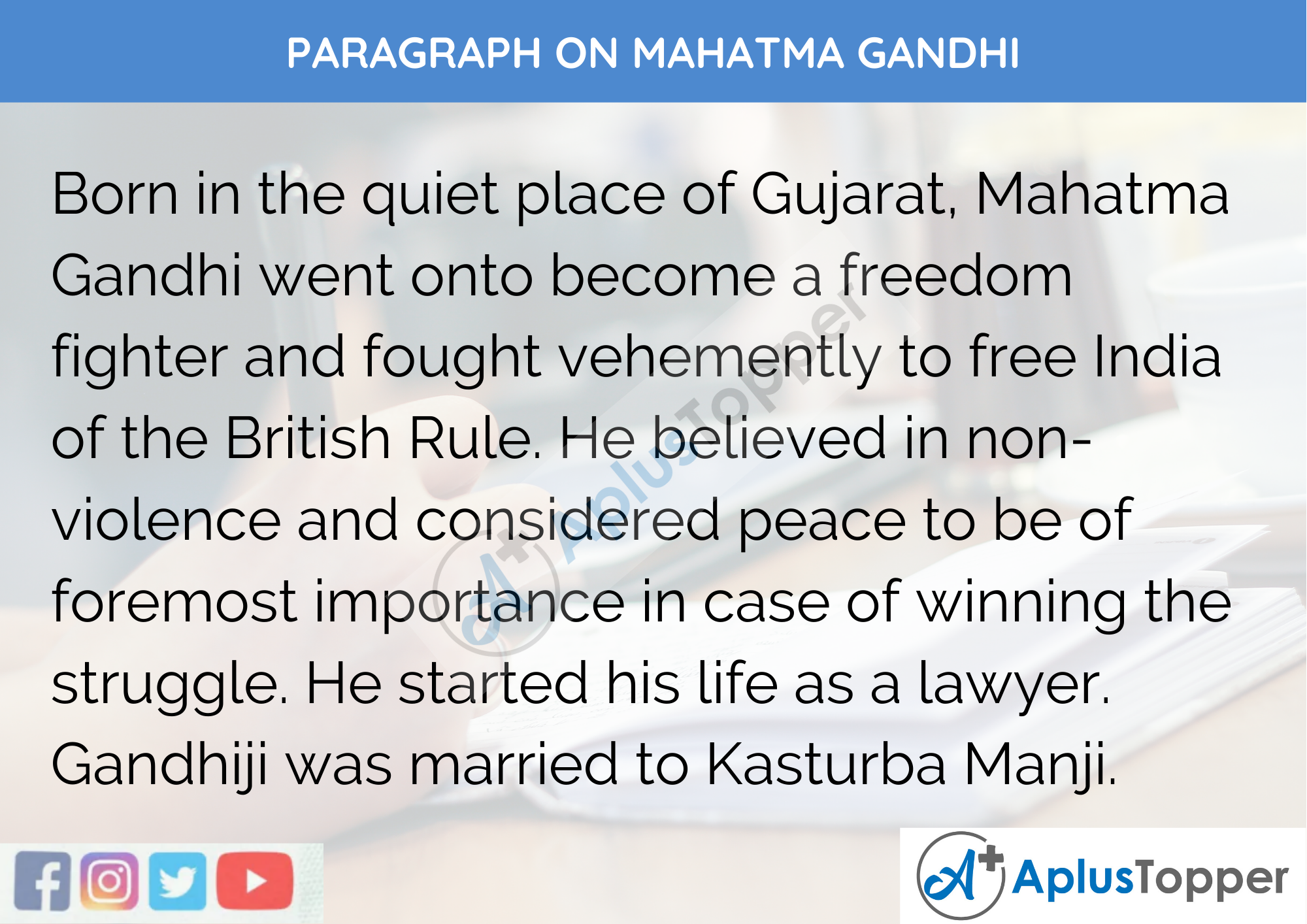
Mahatma Gandhi Paragraph in English – 150 Words for Class 4, 5, 6 School Children
Gandhiji was married to Kasturba Manji. His marriage took place at a very young age of 13. It was the norm of the society then. Mohandas and Kasturba gave birth to a baby boy in the year of 1888. Mahatma Gandhi continued his education and went to South Africa. There he went on to continue his studies in the field of law. He made a good impression on the people in London as a Lawyer. He was called to decide at the tender age of 22. He did his first adjudication at the age of 22 in the year 1891. He did well and was asked to stay back in London. However, his family was in India ad he came back. What ultimately changed Mahatma Gandhi was the discrimination he faced as a person of color in London.
Get 10 Lines on Mahatma Gandhi from here.
Paragraph On Gandhiji – 200 Words for Class 7, 8, 9 Students
He had to face a lot of discrimination based on race. This completely changed his perspective of the world after the discrimination and embracement faced by Gandhi due to his race and color, he vowed to fight and see. He decided to fight against this type of discrimination, and he made it a point to raise his voice vehemently against it. He came back to India to practice law but could not make a career in India. There he lived for the next 20 years of his life.
He also started an ashram in South Africa. His years in South Africa also changed Gandhiji massively. He has now imbibed the values of the mother entirely and decided to fight against the problems of the world in a calm and nonviolent manner. Mahatma Gandhi was the founder of the Natal Indian Congress in the year 1894. He kept fighting against racial discrimination. He had already fought in several civil rights movements in South America. His journey as a civil rights activist begun at the age of 22.
Descriptive Paragraph On Mahatma Gandhi – 250 to 300 Words for Class 9,10,11,12 and Competitive Exams Students
Mahatma Gandhi was born and raised in a Hindu family. He was born along the coastal regions of Gujarat and in Western India. He lived a significant portion of his life in London and completed his education there. Even in London, Gandhiji had acquired a considerable crowd to follow his teachings and principles.
Ahimsa was a term that he had coined in London while studying law. He was called to decide at the tender age of twenty-two. He did his first adjudication in June in the year 1891. He did come back to India for two years after his education. However, these two years were very challenging for him. He remained in his native place of Gujarat and practiced law here. He could not secure himself a proper license for several years in India. He could not start a successful practice in the field of law.
Mahatma Gandhi had represented an Indian Merchant Navy, and that is why he has to go to South Africa. He settled down there and begun his work on civil rights movements. In these years, he vehemently educated himself in the field of justice and civil rights. He was the first India to use a world like Swadeshi and Purna Swaraj. He vehemently opposed casteism, differentiation based on ethnicity. He began his journey by organizing the farmers and peasants into cooperation groups. They opposed taxation excessively on crops by the then rulers of the country. He also wanted to abolish the cruel practice of untouchability.
Read More: Rabindranath Tagore Paragraph
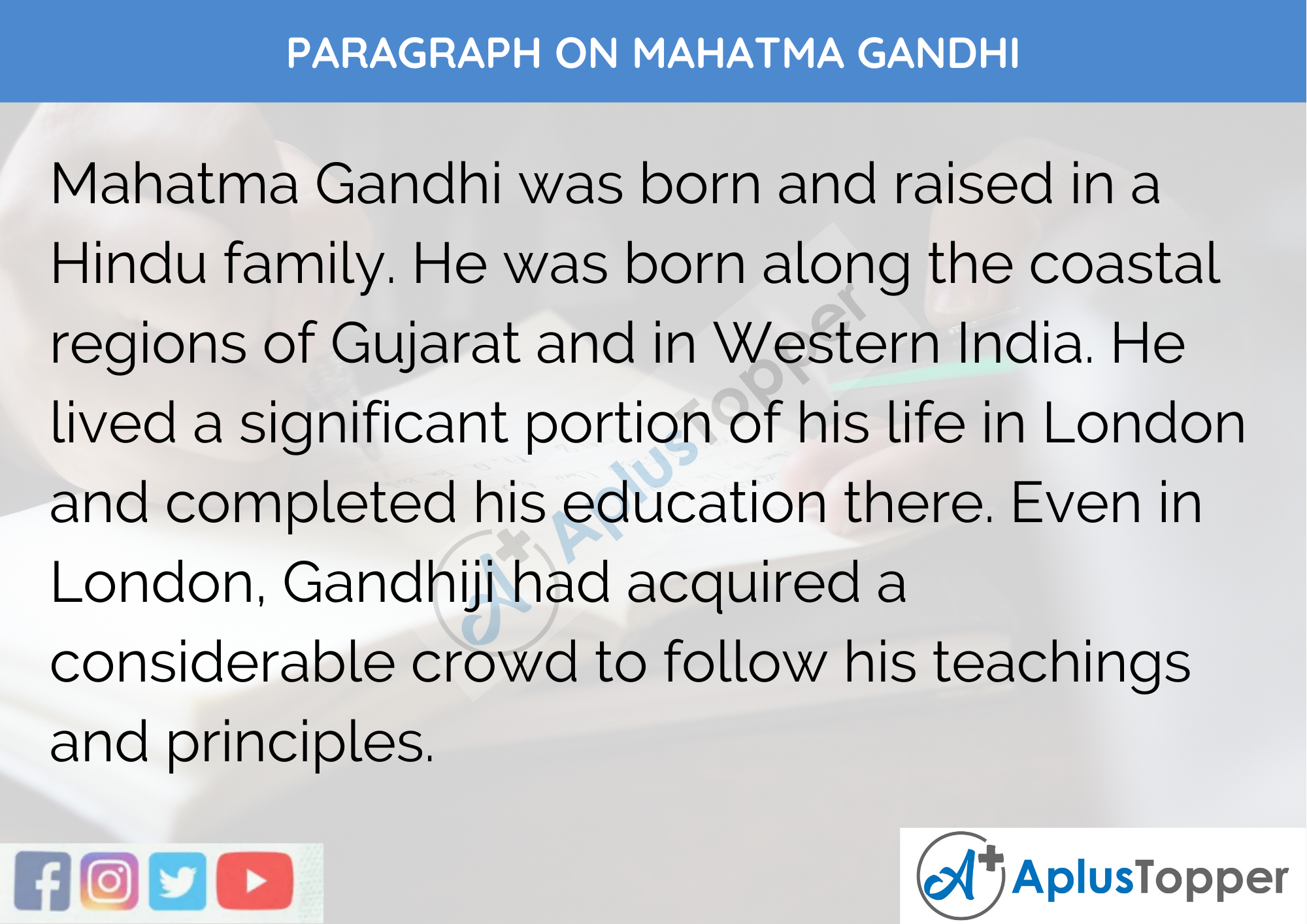
FAQ’s on A Paragraph About Mahatma Gandhi
Question 1. What does the word Mahatma mean?
Answer: Mahatma is the word that roughly translates to great sound in Sanskrit. He was given the name by Rabindranath Tagore. Tagore was very impressed by the work that Gandhi did around the world. He respected him.
Question 2. Did Gandhiji help people with leprosy?
Answer: Yes, Gandhiji helped people with leprosy. He was genuinely passionate about them. He often gave shelter to the lepers of his locality. He was a person with great empathy.
Question 3. What can be called Gandhiji’s accomplishments?
Answer: Mahatma Gandhi tried to uproot various social injustices done to the needy and the oppressed. He was the pioneer of the movement of Satyagraha. In this movement, he made salt out of the sea near Sabarmati. This was an illegal practice; Gandhi was imprisoned for the same. He fought for the freedom of the country and protested against the other ill practices of the world.
Question 4. What did Mahatma Gandhi do for India’s Independence?
Answer: Mahatma Gandhi began the civil disobedience movement after the Jallianwala Bagh massacre. He was an essential part of the Congress and was one of the founding members of the Indian Constitution. He was known as the Great soul for his belief in Guerrilla warfare.
- Picture Dictionary
- English Speech
- English Slogans
- English Letter Writing
- English Essay Writing
- English Textbook Answers
- Types of Certificates
- ICSE Solutions
- Selina ICSE Solutions
- ML Aggarwal Solutions
- HSSLive Plus One
- HSSLive Plus Two
- Kerala SSLC
- Distance Education

Essay on Mahatma Gandhi in English (150, 200, 250, 500 Words)
Here, we’ve presented essays on “Mahatma Gandhi” in 150, 200, 250 & 500 word samples. All the essays will be helpful for students of all classes i.e. 1, 2, 3, 4, 5, 6, 7, 8, 9, 10, 11 & class 12.
Table of Contents
Essay on Mahatma Gandhi in 150 Words
Introduction.
Mahatma Gandhi, a towering figure in India’s history, was born on October 2, 1869, in Porbandar, Gujarat. He spearheaded India’s independence movement through nonviolent civil disobedience, inspiring millions worldwide.
Early Life and Influence
Gandhi’s upbringing in a devout Hindu family instilled in him a strong sense of morality and compassion. His education in law in London exposed him to diverse ideologies, including the principles of nonviolence and civil disobedience. Influenced by the teachings of Leo Tolstoy and Henry David Thoreau, Gandhi developed his philosophy of Satyagraha, advocating for truth and nonviolent resistance.
Leadership in Indian Independence Movement
Upon returning to India, Gandhi became actively involved in advocating for Indian rights in South Africa, leading protests against discriminatory laws. His leadership in the Indian National Congress propelled the movement for independence, emphasizing Swaraj (self-rule) and nonviolent resistance against British colonial rule. His Salt March in 1930 and Quit India Movement in 1942 were pivotal moments in India’s struggle for freedom.
Mahatma Gandhi’s legacy extends far beyond India’s borders. His principles of nonviolence, truth, and tolerance continue to inspire movements for social justice and peace worldwide. Gandhi’s tireless efforts and unwavering commitment to justice have immortalized him as a symbol of hope and resilience for generations to come.

Mahatma Gandhi Essay in 200 Words
Mahatma Gandhi, an icon of peace and nonviolence, was born on October 2, 1869, in Porbandar, Gujarat. His leadership during India’s independence movement and advocacy for civil rights left an indelible mark on history.
Early Years and Influences
Raised in a devout Hindu family, Gandhi imbibed principles of compassion and nonviolence from a young age. His education in law in London exposed him to diverse ideologies, including the works of Tolstoy and Thoreau, shaping his belief in Satyagraha, the power of truth and nonviolent resistance.
Leadership in India’s Freedom Struggle
Returning to India, Gandhi emerged as a prominent figure in the Indian National Congress, advocating for Indian rights in South Africa and leading protests against discriminatory laws. His leadership during pivotal events like the Salt March and Quit India Movement galvanized millions in the fight against British colonialism.
Philosophy and Legacy
Gandhi’s philosophy of Ahimsa (nonviolence) and Sarvodaya (upliftment of all) continues to inspire movements for social justice globally. His emphasis on Swadeshi (self-sufficiency) and communal harmony remains relevant in contemporary discourse.
Mahatma Gandhi’s principles of truth, nonviolence, and empathy are timeless and universal. His legacy transcends borders, serving as a beacon of hope for oppressed peoples worldwide. Gandhi’s life and teachings remind us of the enduring power of peaceful resistance and the importance of leading by example in the pursuit of justice and equality.
Essay Writing on Mahatma Gandhi in 250 Words
Mahatma Gandhi, born on October 2, 1869, in Porbandar, Gujarat, is celebrated globally for his role in India’s struggle for independence. His leadership and philosophy of nonviolence continue to inspire movements for social change.
Growing up in a devout Hindu household, Gandhi was deeply influenced by the Bhagavad Gita and Jain principles of nonviolence. His legal education in London broadened his worldview, where he encountered the works of John Ruskin and Leo Tolstoy, shaping his belief in Satyagraha, or truth-force.
Leadership in India’s Independence Movement
Returning to India in 1915, Gandhi became a prominent leader in the Indian National Congress. His advocacy for civil rights and nonviolent resistance gained momentum, culminating in the Salt Satyagraha of 1930, a defining moment in India’s struggle for freedom.
Impact on Civil Rights
Gandhi’s influence extended beyond India’s borders. His teachings inspired leaders like Martin Luther King Jr. in the United States and Nelson Mandela in South Africa. The principles of Satyagraha and Ahimsa guided numerous movements for civil rights and social justice worldwide.
Contribution to Socio-Economic Reforms
Apart from political activism, Gandhi focused on socio-economic reforms, promoting self-reliance and empowering marginalized communities. His constructive programs aimed at eradicating poverty and promoting rural development left a lasting impact on India’s social fabric.
Legacy and Commemoration
Gandhi’s legacy is commemorated annually on October 2nd, observed as the International Day of Nonviolence. His principles of truth and compassion remain relevant in today’s world, serving as a guiding light for peaceful coexistence and conflict resolution.
Mahatma Gandhi’s life and teachings embody the power of moral courage and resilience in the face of oppression. His commitment to nonviolence and social justice continues to inspire generations, reminding us of the transformative potential of individual action in creating a more just and compassionate world.
Writing an Essay on Mahatma Gandhi in 500 Words
Mahatma Gandhi, born on October 2, 1869, in Porbandar, Gujarat, remains one of the most influential figures in modern history. His leadership and philosophy of nonviolence played a pivotal role in India’s struggle for independence from British colonial rule, inspiring movements for civil rights and social justice worldwide.
Early Life and Formative Years
Raised in a devout Hindu family, Gandhi was deeply influenced by the teachings of the Bhagavad Gita and the Jain principle of Ahimsa (nonviolence). His legal studies in London exposed him to Western philosophy and political thought, where he encountered the works of John Ruskin and Leo Tolstoy. It was during this time that Gandhi developed his philosophy of Satyagraha, or truth-force, as a means of social and political transformation.
Returning to India in 1915, Gandhi emerged as a prominent leader in the Indian National Congress. His advocacy for civil rights and nonviolent resistance gained momentum, leading to significant milestones in India’s struggle for independence. The Salt Satyagraha of 1930, where Gandhi led a march to the Arabian Sea to protest the British salt monopoly, marked a turning point in the movement.
Influence on Global Civil Rights Movements
Gandhi’s principles of nonviolence and civil disobedience resonated far beyond India’s borders. His influence extended to movements for civil rights and social justice worldwide. Figures like Martin Luther King Jr. in the United States and Nelson Mandela in South Africa drew inspiration from Gandhi’s methods of peaceful protest and moral leadership.
Socio-Economic Reforms and Empowerment
In addition to his political activism, Gandhi focused on socio-economic reforms aimed at uplifting the marginalized sections of society. His advocacy for Khadi (homespun cloth) and village industries aimed at promoting self-reliance and economic empowerment among India’s rural population. Gandhi’s efforts in promoting education and sanitation also left a lasting impact on India’s social development.
Commemoration and Legacy
Mahatma Gandhi’s legacy is commemorated annually on October 2nd, observed as the International Day of Nonviolence. His teachings on truth, nonviolence, and communal harmony continue to inspire individuals and movements striving for peace and justice worldwide. Gandhi’s ideals remain relevant in today’s world, where conflicts persist, and the need for compassion and understanding is ever-present.
Contemporary Relevance
In an era marked by global conflicts and social injustices, Gandhi’s message of nonviolence and tolerance holds particular significance. His emphasis on the power of dialogue and reconciliation serves as a beacon of hope in resolving conflicts and fostering harmony among diverse communities.
Mahatma Gandhi’s life and teachings exemplify the transformative power of moral courage and steadfast determination in the pursuit of justice and freedom. His legacy continues to inspire individuals and movements worldwide, reaffirming the enduring values of truth, compassion, and nonviolence in building a more just and peaceful world for future generations.
Related Posts
Essay on zoo in english (150, 200, 250, 500 words).
- May 26, 2024
Essay on Zero Hunger in English (150, 200, 250, 500 Words)
Leave a reply cancel reply.
Your email address will not be published. Required fields are marked *
Name *
Email *
Save my name, email, and website in this browser for the next time I comment.
Post Comment
Essay on Mahatma Gandhi in English | 100, 150, 200, 300 and 400 + Words
Essay on mahatma gandhi in english- 100 words.
Mahatma Gandhi was an important leader in the Indian independence movement. He is best known for his philosophy of nonviolent resistance, which helped India to gain independence from British rule. Gandhi was also a deeply religious man, and he used his beliefs to guide his actions. In this essay, we will discuss Gandhi’s life, his teaching, and his legacy. He advocated for a non-violent approach to resistance, and his tactics helped lead to India’s freedom in 1947. Gandhi was also a prolific writer, and his essays contained powerful messages of equality, justice, and democracy. His words continue to inspire people around the world today.
Essay on Mahatma Gandhi in English- 150 words
Mahatma Gandhi was an influential political leader in India who is best known for leading the country’s non-violent resistance movement against British colonialism. In this essay, we will explore some of Gandhi’s life and accomplishments. Gandhi was born in 1869 in what is now Gujarat, India. He was educated in England and later returned to India to begin his law practice. In 1893, he was thrown off a train for being in a first-class compartment with a second-class ticket. This incident sparked his lifelong commitment to social justice and equality. Gandhi became a leader of the Indian National Congress and fought for India’s independence from British rule. He advocated for non-violent resistance and civil disobedience. His philosophy of satyagraha, or “truth force,” inspired many people around the world. In 1947, India finally gained its independence from Britain. After years of peaceful protests and civil disobedience, Gandhi had helped lead his country to freedom.
Essay on Mahatma Gandhi in English- 200 words
Mahatma Gandhi was an inspiring figure who fought for India’s independence from British rule. He is also celebrated for his philosophy of nonviolent resistance. In this essay, we will examine Gandhi’s life, his work for Indian independence, and his legacy. Gandhiji (paragraph on mahatma gandhi) was born in 1869 in what is now Gujarat, India. He studied law in London and later returned to India to begin practicing. However, he soon became involved in the nationalist movement fighting for India’s independence. Gandhi(essay on mahatma gandhi) believed in using peaceful methods to achieve political goals, and he became the leader of the Indian National Congress party. Under Gandhi’s leadership, the Indian National Congress protested against British policies through mass campaigns of civil disobedience. One of the most famous campaigns was the Salt March, during which protesters walked 240 miles to the sea to collect salt, defying British laws that taxed salt production. This campaign and others like it earned Gandhi international respect as a leader of peaceful resistance.In 1947, after years of struggle, India finally gained its independence from Britain. However, the new nation was immediately plunged into religious violence between Hindus and Muslims. Gandhi worked tirelessly to promote religious tolerance and peace.
Essay on Mahatma Gandhi in English- 300 words
Introduction.
Mohandas Karamchand Gandhi was the leader of the nationalist non-violence movement against British rule in India and as such was known for his doctrine of Satyagraha. He was referred to as “Mahatma” or “Great-Souled” by his followers.
Youth life of Mahatma Gandhi
Gandhi was born to his father’s 4th wife. He was born in Porbandar, the chief minister of his father. As a child he was restless, roaming and playing a lot. But as he got older he began to see he had been labelled short and spindly which prevented him from participating in athletics. Gandhi was very religious and would spend time reading Bhagavad-Gita, Tolstoy, and the Bible with great enthusiasm.
Education of Gandhi Ji
Soon after his graduation, Gandhi tried to open a law practice with very little success. He got a job in the South African Company and experienced widespread prejudice. Gandhi attended the University of Bombay and UCL. He was admitted to the bar exam in England. After traveling to South Africa, he experienced discrimination and racism.
Contribution of Gandhi ji
Gandhi refused to join in Indian politics, but he supported the British by recruiting soldiers and denouncing violence. In 1919, the British pushed through a law that empowered authorities to imprison Indians without trial. Today, people are unaware of the Indian Independence movement and of Gandhi’s actions in it. In response, he declares a satyagraha struggle to protest against the British Raj. This is a virtual political earthquake since many violent outbreaks follow, with the massacre at Amritsar being especially important. Mahatma Gandhi’s influence in India was never seen before, and in 1922 he was arrested for sedition with a 6-year sentence. Gandhi became the president of Congress Party in 1924. Mahatma began the Civil Disobedience Movement in 1930, which was a practice where the individuals refused to obey orders but faced violence and brutality. Mahatma Gandhi was a prominent independence activist, who has inspired many.
Mahatma Gandhi was one of the most influential figures of the 20th century. His philosophy of nonviolent resistance helped to end British rule in India and inspired movements for civil rights and freedom around the world. Gandhi’s life and teachings continue to be an inspiration to people all over the world who are striving for justice and equality.
Essay on Mahatma Gandhi in English 500 words
Mahatma Gandhi is one of the most influential figures in modern history. Born in India in 1869, Gandhi was a lawyer who fought for Indian independence from British rule. He is best known for his philosophy of nonviolent resistance, which helped lead India to independence in 1947. Gandhi also played a key role in improving relations between Hindus and Muslims. After his death in 1948, he remains an inspiration for people all over the world who are fighting for justice.
Who was Mahatma Gandhi?
Mahatma Gandhi was an Indian political leader who fought for India’s independence from British rule. After years of peaceful protests and civil disobedience, Gandhi helped lead India to independence in 1947. He is also celebrated for his philosophy of nonviolent resistance.
Early Life of Mahatma Gandhi
Born on October 2, 1869 in Porbandar, India, Mohandas Karamchand Gandhi was the youngest of three sons. His father, Karamchand Gandhi, served as the diwan (chief minister) of Porbandar state. His mother, Putlibai, was a devout Hindu who fasted regularly. As a child, Gandhi was shy and thoughtful. He excelled in his studies and was popular among his classmates. At the age of thirteen, Gandhi married Kasturbai Makhanji in an arranged marriage. The couple had four children, but only two survived infancy. In 1888, Gandhi traveled to England to study law. While there, he was profoundly influenced by the works of Henry David Thoreau and Leo Tolstoy. After returning to India in 1891, Gandhi began practicing law in Bombay (now Mumbai). In 1893, Gandhi was thrown off a first-class train compartment after refusing to give up his seat to a white man. This incident made him realize the depth of discrimination against Indians in South Africa. He stayed in South Africa for twenty years, fighting for the rights of Indian immigrants. In 1915, he returned to India and continued his work for social
Key Events in Mahatma Gandhi’s Life
- 1869- Gandhi is born in Porbandar, India
- 1893- Gandhi finishes his law studies in London and returns to India
- 1899- 1901- Gandhi works as a lawyer in South Africa
- 1906- Gandhi returns to India
- 1915- Gandhi is arrested for the first time in his life
- 1920- Gandhi launches the Non-Cooperation Movement
- 1930- Gandhi leads the Salt March
- 1942- Gandhi is arrested again, this time for leading the Quit India Movement
- 1948- Gandhi is assassinated by Hindu nationalist Nathuram Godse
The Philosophy of Mahatma Gandhi
Mahatma Gandhi is considered one of the most influential figures of the 20th century. His philosophy of nonviolent resistance helped lead India to independence from British rule, and has been an inspiration for social and political activists around the world. Gandhi’s philosophy of nonviolent resistance is based on the belief that violence only begets more violence, and that true change can only be achieved through peaceful means. This philosophy was put into practice during Gandhi’s years leading the Indian independence movement, when he advocated for peaceful protests and civil disobedience against the British government. Although Gandhi’s philosophy has been criticized by some as being too idealistic, his legacy continues to inspire people who are fighting for social change. In a world that often seems dominated by violence, Gandhi’s message of peace and nonviolence is more relevant than ever.
The Legacy of Mahatma Gandhi
Mahatma Gandhi was one of the most influential political figures of the 20th century. He is best known for his philosophy of nonviolent resistance, which helped lead India to independence from British rule. After his death, Gandhi’s legacy continued to inspire people around the world who were struggling for social justice. Today, on the anniversary of Gandhi’s birth, we remember his life and work. We also reflect on how his example continues to challenge and inspire us in our own quest for justice.
What did he do?
Mahatma Gandhi was an influential political leader in India who is best known for his philosophy of nonviolent resistance. He played a pivotal role in leading the country to independence from British rule, and he also advocated for the rights of minorities and the poor. After his assassination in 1948, Gandhi became an icon for peace and justice around the world.
Why is he important?
Mahatma Gandhi is considered one of the most important figures in history. He is known for his non-violent resistance movement against British colonialism in India. He also played a key role in the Indian independence movement. After years of peaceful protests and civil disobedience, Gandhi helped lead India to independence in 1947. He is also celebrated for his philosophy of nonviolent resistance, which inspired other freedom fighters across the world, including Martin Luther King Jr. and Nelson Mandela.
How has he influenced the world?
Mahatma Gandhi was an Indian independence leader who fought against British colonial rule. He is also celebrated as a champion of non-violent protest and civil disobedience. His legacy continues to inspire people around the world who are seeking social justice.
The essay on Mahatma Gandhi in English has shown us that he was a great leader who fought for the rights of his people. He was a man of peace and always strived to bring people together. He is an inspiration to all of us and we should strive to follow his example.
Related Posts

Essay on Mahatma Gandhi in English for Students
Essay on Mahatma Gandhi: Mahatma Gandhi is a major figure in India's quest for independence. Mahatma Gandhi is highly esteemed as an emblem of peace, equity, and nonviolent opposition.
November 14, 2023

Table of Contents
The essay on Mahatma Gandhi focuses on the life of Mohandas Karamchand Gandhi, also known as Father of Nation. Every year, on October 2nd, we observe Gandhi Jayanti to honour his efforts and beliefs. Schools and colleges mark this day by organising writing competitions and delivering patriotic speeches about Mahatma Gandhi. It is a national holiday, and all banks remain closed. This essay sheds light on his remarkable contributions and lasting legacy.
Essay on Mahatma Gandhi in English
Born on October 2, 1869, in Porbandar, India, Mahatma Gandhi led India’s fight against British rule. His legacy centres on nonviolence, civil disobedience, and social justice, impacting the world and inspiring many movements globally.
At 18, Gandhi journeyed to London to pursue law, initiating his exposure to Western thought and culture and sparking a profound interest in philosophy, ethics, and nonviolent resistance. His activism commenced in South Africa, where he spent over two decades combating racial discrimination and injustice. It was in this crucible that he first experimented with satyagraha, a nonviolent resistance rooted in truth and moral force.
Gandhi’s South African experiences profoundly influenced his philosophy, laying the groundwork for his pivotal role in India’s quest for independence. His life and teachings continue to inspire individuals and movements worldwide.
In 1915, Gandhi came back to India, swiftly rising as a key figure in the Indian National Congress. His philosophy, centred on nonviolence (ahimsa), became the cornerstone of the Indian independence movement. Gandhi believed that genuine independence could only be attained through nonviolent methods, highlighting the transformative force of love and compassion.
A pivotal moment in Gandhi’s civil disobedience was the Salt March of 1930. Protesting the British salt monopoly, he led a 240-mile march to the Arabian Sea. There, he and his followers definitely broke salt laws by gathering natural salt from the shores. This symbolic gesture rallied the masses and drew global attention to India’s pursuit of freedom.
Gandhi’s dedication to nonviolence extended beyond politics to encompass all facets of life. He championed communal harmony, religious tolerance, and the empowerment of the oppressed. His teachings left a lasting impact on leaders who embraced nonviolent resistance in their quests for justice.
Gandhi’s life tragically ended on January 30, 1948, when a Hindu nationalist assassinated him. Despite his early demise, Gandhi’s legacy persists. His nonviolence philosophy still influences global change, guiding individuals and movements morally. The United Nations marks October 2, Gandhi’s birthday, as the International Day of Non-Violence, recognizing his lasting impact on peace and justice.
Mahatma Gandhi, the advocate of nonviolent resistance, looms large in history. His life and teachings keep inspiring millions, emphasising the transformative strength of love, truth, and moral force. Reflecting on his legacy challenges us to embrace nonviolence principles in our lives and contribute to a more just and compassionate world.
Essay on Mahatma Gandhi 200 words
Born on October 2, 1869, in Porbandar, India, Mahatma Gandhi is globally revered. His life and teachings left an enduring mark on human civilization. Gandhi, India’s Father of the Nation, led the country to independence using non-violent civil disobedience, which he termed Satyagraha.
Gandhi’s early life emphasised morality and commitment to truth. His parents instilled simplicity, honesty, and service values. After law education in England, Gandhi worked as a lawyer in South Africa, where he witnessed Indian community discrimination, sparking his dedication to social justice.
Gandhi’s philosophy centred on non-violence or Ahimsa. He believed means must match the purity of goals. Violence, he argued, perpetuated hatred; instead, he endorsed passive resistance and civil disobedience for social and political change. His Satyagraha campaigns in South Africa and India showcased non-violent protest’s effectiveness.
During India’s independence struggle, Gandhi’s leadership was crucial. The 1930 Salt March protested the British salt monopoly, highlighting non-violent resistance’s power. Gandhi’s principles influenced global civil rights movements, inspiring leaders like Martin Luther King Jr.
Gandhi envisioned a society based on truth, equality, and non-violence, extending beyond political freedom. Swaraj, or self-rule, included individual self-discipline, a decentralised economy, and uplifting the downtrodden.
His commitment to communal harmony and religious tolerance aimed to bridge gaps between Hindus and Muslims. His assassination in 1948 marked a tragic end to a life dedicated to truth and harmony.
Gandhi’s impact transcends India’s borders. His teachings on non-violence, truth, and social justice inspire global movements. The UN declared his birthday, October 2, as the International Day of Non-Violence.
In conclusion, Gandhi’s life exemplifies non-violence and moral strength’s transformative power. Satyagraha, Ahimsa, and Swaraj remain beacons for those aspiring to a just and peaceful world. Gandhi’s legacy urges us to pursue truth and justice, bringing change even amid challenges.
Essay on Mahatma Gandhi 150 Words
Born in Porbandar, India, on October 2, 1869, Mahatma Gandhi played a crucial role in India’s fight for independence and gained global recognition for promoting nonviolent resistance.
Encountering racial discrimination in South Africa during his early years strengthened Gandhi’s dedication to combating injustice through nonviolent means. Guided by his spiritual convictions, he advocated for the philosophy of “ahimsa,” or nonviolence, viewing it as a potent catalyst for bringing about social and political transformations.
Gandhi led iconic acts, like the Salt March in 1930 and adopting “Satyagraha” (insisting on truth) as a political strategy, crucial for India’s independence.India got independence on August 15, 1947, fulfilling Gandhi’s vision of a united, free nation.
Gandhi’s impact spans the globe, shaping civil rights icons like Martin Luther King Jr. and Nelson Mandela. His beliefs in truth, simplicity, and justice persist, fueling global efforts for peace, fairness, and human rights.
In brief, Mahatma Gandhi’s existence and lessons underscore the far-reaching power of nonviolence, forming an enduring heritage experienced worldwide, transcending cultures and time.
Essay on Mahatma Gandhi 400 Words
Mahatma Gandhi, India’s “Father of the Nation,” was a significant leader in the country’s fight for independence. Born on October 2, 1869, in Porbandar, Gujarat, he grew up in a devout Hindu family and became a key figure in India’s history.
Gandhi’s philosophy of nonviolence, called “Satyagraha,” played a crucial role in India’s independence struggle against British rule. He developed this approach during his time in South Africa, facing racial discrimination and using nonviolent civil disobedience against injustice.
Returning to India, Gandhi became a leader advocating for Indian rights, emphasising truth and nonviolence for social and political change. His unique leadership style involved living a simple life, reflected in his clothing – a loincloth and shawl, a contrast to the opulence of other leaders.
Gandhi addressed social issues such as untouchability, poverty, and education, envisioning a harmonious society without discrimination. His campaign against untouchability aimed at abolishing this social evil, promoting equality.
The Salt March in 1930 was a defining moment. In protest of British salt monopoly, Gandhi walked 240 miles to the Arabian Sea, producing salt illegally. This nonviolent act gained global attention, inspiring others to join the fight for independence.
Gandhi’s commitment to nonviolence was tested during the Jallianwala Bagh massacre in 1919. Despite British brutality, he urged peaceful protests, upholding his principles.
His impact extended beyond politics, addressing social issues like untouchability, poverty, and education. He envisioned a society where all individuals could live together harmoniously, regardless of caste or creed.
The Salt March in 1930 symbolised nonviolent resistance and civil disobedience against British salt monopoly. Gandhi and followers walked 240 miles, producing salt illegally, capturing global attention and inspiring others.
Gandhi’s commitment to nonviolence faced challenges, notably during the Jallianwala Bagh massacre in 1919. Despite British violence, he advocated peaceful protests.
Gandhi’s teachings continue to inspire civil rights movements worldwide. His emphasis on individual responsibility, self-discipline, and moral courage resonates across ages. Gandhi’s legacy influenced leaders like Martin Luther King Jr. and Nelson Mandela, applying his principles in their struggles against injustice.
In conclusion, Mahatma Gandhi’s life and philosophy made a lasting impact. His commitment to truth, nonviolence, and social justice earned him global respect. Even at the elementary level, students can draw inspiration, learning about peaceful resistance, equality, and individual convictions. Gandhi’s teachings remain relevant, guiding movements toward a just and compassionate world.
Essay on Mahatma Gandhi for Class 4
Born on October 2, 1869, in Porbandar, India, Mahatma Gandhi is hailed as the Father of the Nation. His ideas shaped global movements for civil rights and freedom. This essay introduces Gandhi’s life and legacy.
Gandhi’s early years were marked by simplicity. Raised in a devout Hindu family, he learned values like truth and non-violence early on. Despite being an average student, he showed an early interest in social issues. At 19, he went to London to study law, a decision influencing his leadership in India’s fight for independence.
Returning to India, Gandhi faced racial discrimination in South Africa, sparking his passion for justice and shaping his philosophy of nonviolent resistance. He believed in satyagraha, a passive resistance rooted in truth and nonviolence, realising its power for social and political change.
Leading India against British rule, Gandhi united millions across caste, religion, and class. The iconic Salt March in 1930 symbolised self-reliance and showcased nonviolent resistance’s strength.
Gandhi’s commitment to nonviolence was a lifestyle, emphasising simplicity, self-reliance, and truthfulness. His influence extended globally, inspiring figures like Martin Luther King Jr. and Nelson Mandela in their fights for civil rights and against apartheid.
In conclusion, Gandhi’s life and teachings remain relevant and inspirational. His dedication to truth and justice played a crucial role in India’s independence and influenced the global fight against oppression. Introducing Gandhi’s principles to the youth ensures his legacy lives on, fostering a world built on love, compassion, and justice. Mahatma Gandhi will be remembered as a guiding light in the quest for a better, more just world.
Essay on Mahatma Gandhi for Class 5
Mahatma Gandhi, or Mohandas Karamchand Gandhi, led India to independence through nonviolent resistance. Born on October 2, 1869, in Porbandar, Gujarat, he embodied civil disobedience, earning the title “Mahatma” or great soul.
Gandhi’s childhood was simple, raised in a devout Hindu family with his father as Porbandar’s prime minister. Despite privilege, he was a reserved child, educated in Porbandar and Rajkot, developing an interest in law. At 18, in 1888, he began his transformative journey by studying law in London.
Returning to India in 1891, Gandhi practised law, but his focus shifted to social and political issues. Working as a lawyer in South Africa from 1893, he encountered racial discrimination, inspiring nonviolent protests and the philosophy of Satyagraha, emphasising truth’s force.
Gandhi’s return to India in 1915 marked a pivotal moment in the independence struggle. Leading the Indian National Congress, he championed nonviolence and self-rule. His influence grew with movements like Non-Cooperation and Civil Disobedience, challenging British rule through peaceful means.
The Salt March of 1930, a protest against the British salt tax, gained global attention, highlighting the power of nonviolent resistance. Gandhi’s unwavering commitment to nonviolence influenced not only India’s independence but also global civil rights movements, including Martin Luther King Jr.’s in the U.S.
Gandhi faced challenges, yet he stood strong, convinced that love and compassion could conquer oppression. His death on January 30, 1948, marked the era’s close, but his influence persists. Gandhi’s lessons on nonviolence, truth, and justice still motivate positive change through peaceful methods. His life proves the lasting power of principles that surpass time and borders.
Essay on Mahatma Gandhi for Class 6
Mahatma Gandhi, born on October 2, 1869, in Porbandar, India, was a pivotal figure in the Indian independence movement and a global advocate for nonviolent resistance.
Gandhi’s early experiences with racial discrimination in South Africa fueled his commitment to fighting injustice through nonviolence. Rooted in his spiritual beliefs, he championed the philosophy of “ahimsa,” or nonviolence, as a powerful force for social and political change.
Raised in a devout Hindu family with a political history, Gandhi studied law in London and faced discrimination in South Africa, shaping his commitment to social justice and non-violence. His philosophy, grounded in “Ahimsa” or non-violence, believed in love and compassion as tools for change. Satyagraha, meaning “truth force,” guided his fight against injustice and colonial oppression.
A pivotal moment was the 1930 Salt March, a 240-mile protest against British salt monopoly. This act of civil disobedience showcased the power of nonviolent protest, drawing global attention and advancing India’s fight for independence.
Gandhi, beyond a political leader, advocated communal harmony and religious tolerance. His commitment to non-violence extended to resolving Hindu-Muslim conflicts during heightened tensions. His teachings influenced leaders like Martin Luther King Jr., Nelson Mandela, and Cesar Chavez, shaping civil rights movements globally.
Mahatma Gandhi’s legacy transcends India’s struggle for independence. His life and philosophy emphasise the transformative potential of non-violence, individual conscience, and moral courage in the pursuit of justice and freedom. Gandhi’s principles remain relevant, inspiring generations worldwide toward a more just and compassionate world.
Essay on Mahatma Gandhi FAQs
Mahatma Gandhi, born Mohandas Karamchand Gandhi (1869-1948), was a key leader in India's struggle for independence against British rule. He was a prominent advocate for nonviolent civil disobedience and played a crucial role in shaping India's destiny.
Gandhi is called "Mahatma," which means "Great Soul" in Sanskrit, as a term of respect and admiration. The title reflects his moral and spiritual leadership, as well as his commitment to nonviolence, truth, and the welfare of humanity.
Gandhiji is of immense importance due to his role in India's independence. His teachings on truth, nonviolence, and social justice continue to inspire movements worldwide. Gandhi's impact extends beyond political realms, influencing ideas of civil rights, freedom, and peaceful protest.
Mahatma Gandhi is often referred to as the "Father of the Nation" in India for his pivotal role in the country's struggle for independence and his enduring influence on its values and principles.

Health is Wealth essay in English For Students
Paragraph on Discipline in English for School Students

.st1{display:none} Related Articles
- Bihar Board Exam Date 2025 PDF Download Soon 10, 12 Time Table
- Important Questions for Class 11 Maths Chapter Wise Solution PDF
- CBSE 10th Science Previous Year Paper PDF Download
- CBSE Class 10 Maths Solutions, Notes, MCQ and Sample Question
- CBSE Date Sheet 2025 OUT Download PDF Class 10th, 12th Here
- CBSE Class 10 Date Sheet 2025 OUT @cbse.gov.in Download PDF
- CBSE Class 12 Date Sheet 2025 OUT Download Stream Wise PDF
- CBSE Class 10 Syllabus 2024-25 PDF Download Subject Wise
- ICSE Date Sheet 2025 OUT Soon Check ICSE Time Table
- Important Questions for Class 11 Maths Chapter 10 PDF Download

Have doubts?
Our support team will be happy to assist you!
- Growth & Development
- Play & Activities
- Life Skills
- Play & Learning
- Learning & Education
- Rhymes & Songs
- Preschool Locator

Essay on Mahatma Gandhi In English for Students and Children

- Key Points To Remember When Writing An Essay On Mahatma Gandhi
- 5 Lines On Mahatma Gandhi
- 10 Lines On Mahatma Gandhi
Paragraph On Mahatma Gandhi
- Short Essay On Mahatma Gandhi
- Long Essay On Mahatma Gandhi
Major Movements of Mahatma Gandhi
What will your child learn from an essay on mahatma gandhi, interesting facts about mahatma gandhi for kids.
Mahatma Gandhi is a famous historical figure. He is known as the father of our nation and is well-regarded by all the country’s citizens and people worldwide. Most Indian children are familiar with Gandhiji and learn about his contribution to the Indian freedom struggle in school. Students may be asked to write an essay on Gandhiji as a class exercise or for a test or competition.
For this assignment, they must learn and remember facts about his life and how he fought for India’s independence. This may sound challenging for some children, but with guidance, they will be able to write this essay on their own. Here is an essay on Mahatma Gandhi for classes 1, 2 and 3 that will help school children with their assignments.
Key Points To Remember When Writing An Essay On Mahatma Gandhi
The essay about Mahatma Gandhi is slightly different from essays on general topics. Children need to remember accurate facts and weave a good narrative for these kinds of topics. If you are tasked with writing a Mahatma Gandhi essay in English, the following is for you. Here are some essential points to remember:
Before starting the essay, it is important to remember facts such as names, places, events and dates accurately.
For short essays, stick to facts about Gandhi and do not dive deep into any specific topics.
For longer essays, start the introduction about the importance of the man in Indian history.
Talk about his early life and work and transition to the ideology of Gandhiji.
Finally, end the essay with his impact on the nation and how he inspired people.
5 Lines On Mahatma Gandhi
Mahatma Gandhi, a beacon of peace and non-violence, played a pivotal role in India’s struggle for independence, inspiring countless generations. In just a few lines on Mahatma Gandhi for class 1, students can learn about his remarkable life and values, making it a perfect starting point for a simple essay on Mahatma Gandhi.
- Mahatma Gandhi was born on October 2, 1869, in India and is known as a great leader.
- He taught people to be kind and to solve problems without fighting.
- Gandhi wanted India to be free from British rule, so he chose non-violence and led peaceful marches.
- One famous march was the Salt March, where he walked a long way to make salt from the sea.
- Gandhi’s ideas of peace and love still help people today.
10 Lines On Mahatma Gandhi
Children of lower primary classes may be asked to write a short essay on Mahatma Gandhi. This can be done by writing ten lines about Mahatma Gandhi. Below are the top ten factual lines about Mahatma Gandhi that will help you write a perfect essay on Gandhiji, the national personality:
Mahatma Gandhi is well-known as a freedom fighter and the father of our nation. He is popularly called Bapu.
He was born in Porbandar, Gujarat on October 2, 1869.
His father’s name was Karamchand Gandhi, and his mother’s name was Putlibai Gandhi.
Gandhiji was married to Kasturba Kapadia.
He went to London to pursue his higher education.
He worked in South Africa as a civil rights activist and fought against racial discrimination.
In 1915 he started the Indian National Congress party.
Gandhiji was a firm believer in ahimsa , which means non-violence, and followed the path of satya vachan, which means being truthful.
As a leader of the freedom struggle, he began his first anti-British movement in 1917.
He was shot to death on January 30, 1948.
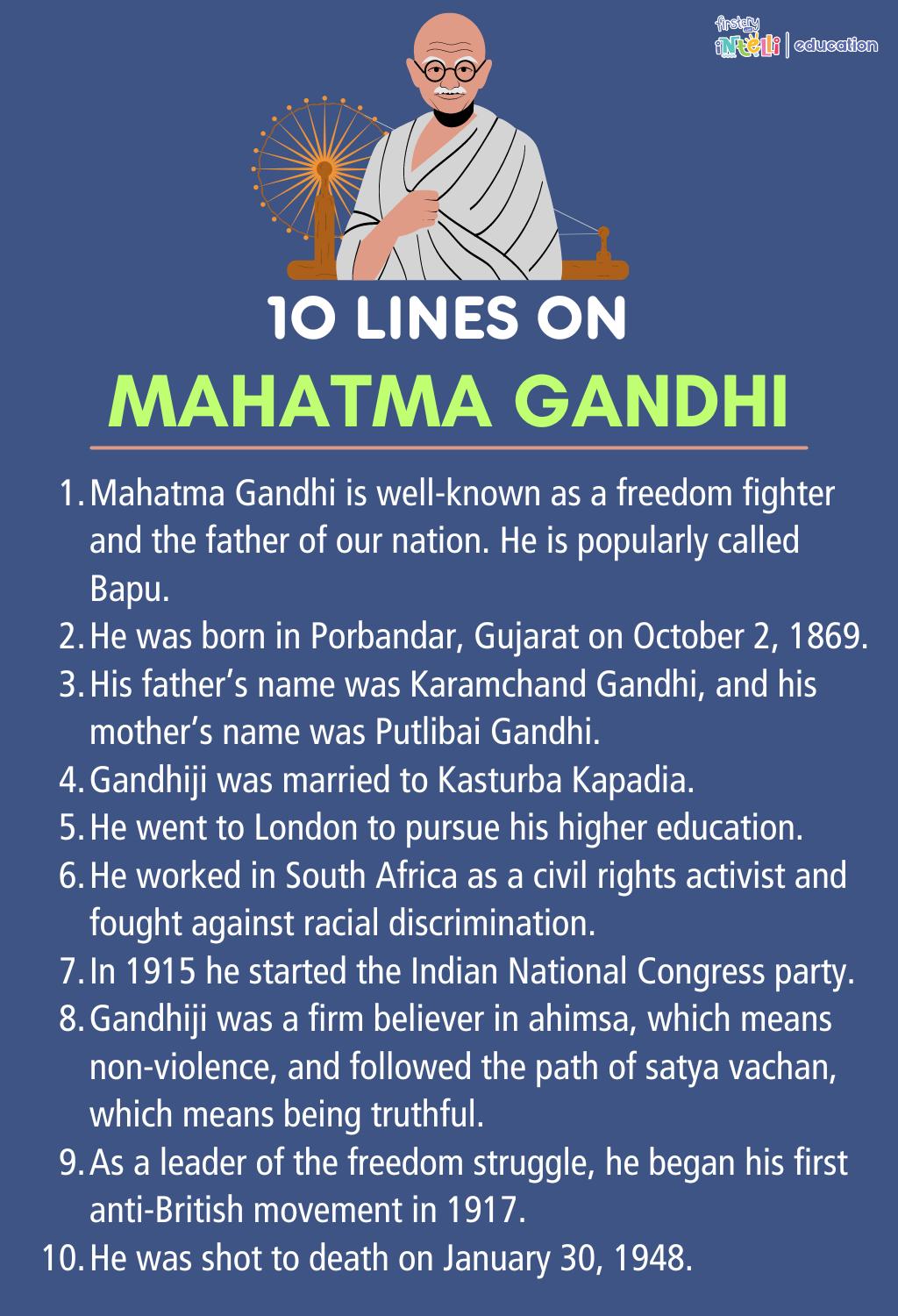
Before writing longer essays, we should practice writing a paragraph on Mahatma Gandhi in 100 words. Here’s a short paragraph on Mahatma Gandhi to aid that. Let’s look at the paragraph on this national personality.
Mahatma Gandhi, born October 2, 1869, in Porbandar, India, is one of India’s most iconic historical figures. He has several monikers, such as ‘the Father of the Nation’, ‘Bapu’, ‘Mahatma’, ‘ Rashtrapita ‘, and many more. Gandhiji is popular for his non-violence (Ahimsa) and civil disobedience philosophy. He is also known for his simplicity, truthfulness, and dedication to social justice. Lakhs of people joined Mahatma Gandhi in his journey to free India from the colonial rule. He and his supporters organised movements like the Dandi March (Salt March) and the Quit India Movement, eventually leading to India’s independence in 1947. He was assassinated on January 30, 1948, but his principles and message endure as a beacon of hope and unity.
Short Essay On Mahatma Gandhi
When asked to write a short essay on Mahatma Gandhi, students can list the highlights they remember about Gandhiji’s life and weave them into a paragraph. Here is a sample essay on Mahatma Gandhi in 150 to 200 words:
Mohandas Karamchand Gandhi is the most popular historical figure in the nation. He was born in Porbandar, Gujarat, on October 2, 1869. His family was affluent, and he had a good reputation as a quiet-natured boy. He went to London for his higher education, where he studied law and became a Barrister. Upon his return to India, he practised law at the Bombay High Court.
Gandhiji later moved to South Africa to work but soon lost interest in law. Instead, he joined hands with the natives there to start satyagraha—a non-violent protest against the oppression of Europeans. He soon returned to India and joined the struggle for independence from British rule.
He was a simple man who taught simplicity and self-reliance to the people in India. He encouraged them to boycott foreign goods and make their Swadeshi goods. He was loved and respected by people of all communities.
As a freedom fighter, Gandhi was a man of firm conviction. During his freedom struggle, the British had put him in jail several times, where he endured extreme hardships. To honour his role in the freedom struggle, his birthday is a national holiday to pay homage to him and everyone who stood with him.
Long Essay On Mahatma Gandhi
A long essay on Gandhi requires students to know and remember several details on his life and write them with a good narrative. Writing a Mahatma Gandhi essay in English in 500 words or more is not difficult. Here is a sample essay for class 3 students on Mahatma Gandhi:
Mohandas Karamchand Gandhi, also called Mahatma Gandhi, is the father of our nation. He was a freedom fighter, national leader, and social reformer who worked tirelessly to make India independent. Famous poet Rabindranath Tagore gave him the title of Mahatma. In Sanskrit, ‘Mahatma’ means ‘Great Soul ’. He was given this name for his non-violent approach to the freedom movement, contributions to social reform, and convictions to lead a simple life. Since his time, Gandhiji and his philosophy have inspired all social reform movements.
Birth And Childhood
Mahatma Gandhi, aka Mohandas Karamchand Gandhi, was born on 2 October 1869 in the small town of Porbandar, Gujarat. His father, Karamchand Uttamchand Gandhi, was the Diwan of Porbandar and Rajkot and also a court official in Porbandar. Born to a religious woman, Putlibai Gandhi, Mahatma Gandhi became one of the top representatives in India’s struggle for independence from British colonial rule, known for his philosophy of non-violence (Ahimsa) and civil disobedience.
Marriage And Education
Gandhiji was raised with simplicity, although he was from an affluent family. He was a firm believer in non-violence, which was reflected in his approach to anything he did. Gandhiji went to England in 1888 to study law and become a barrister. After Gandhiji moved to Africa as a lawyer, he soon quit his profession to join the local people in their struggle against European oppression. He spent 20 years fighting discrimination in South Africa before returning to India.
Contribution To India’s Independence
The people who followed him loved his ideology of ‘Ahimsa‘ or non-violence. He realised early on that there was a great force in the philosophy of non-violence at a mass level for the freedom movement. He believed in self-reliance and made his clothes, which started the ‘Khadi movement’. He urged Indians to boycott foreign products and make their own to increase self-reliance. The British put him in jail many times because of his strong stand. His efforts, combined with the sacrifices of all freedom fighters, were successful, and India gained independence.
Mahatma Gandhi and his non-violent approach have been appreciated throughout history, and he became a global role model. His legacy extends beyond India’s borders, inspiring worldwide movements for civil rights, freedom, and social change. Bapu’s teachings and practices continue to be a model of inspiration for those advocating peace, justice, and human rights. He will continue inspiring people everywhere to build a better and more just world for generations.
Mahatma Gandhi led several successful campaigns and movements in his time to achieve independence from the colonial government, Let’s talk about some of the major movements of Gandhiji in detail:
1. Champaran and Kheda Satyagraha (1917 – 1918)
Gandhi’s early Satyagrahas (non-violent resistance) in Champaran and Kheda addressed issues faced by indigo and cotton farmers, respectively. Due to meagre agriculture production and crop failure due to unfavourable weather along with high taxation, the situation of farmers deteriorated drastically. Along with farmers and several supporters, Mahatma Gandhi started protests and strikes that eventually led to the British noting the farmers’ demands and doing what was needful for them.
2. Khilafat Movement (1919)
Mahatma Gandhi supported the Khilafat Movement, started by Ali brothers in Turkey against the unfair treatment of Turkey after the First World War, which aimed to protect the Ottoman Empire’s caliphate. He presided over the All India Conference in Delhi and even returned the awards he achieved in the British Empire’s South Africa. He came to the limelight of many Indians for his doings against the British empire, which eventually strengthened his position as a national leader.
3. Non-Cooperation Movement (1920)
The Civil Disobedience Movement aimed to fight unjust laws peacefully with the assistance from the Congress. Under the leadership of Gandhiji, several Indians refused to obey certain British laws and pay taxes. People began boycotting British goods and services, which resulted in mass arrests and heightened global awareness. However, after the Chauri Chaura incident with the killing of 23 police officers, Gandhiji put a stop to the movement.

4. Civil-Disobedience Movement (1930)
The Non-Cooperation Movement aimed at the boycotting of British institutions, schools, and goods by Indians. Several students dropped out of college, and many government employees quit their British jobs. People also boycotted imported clothing, refused to pay taxes, held protests, etc. Millions of people supported and participated in this movement, and it marked a turning point in India’s fight for independence.
5. Quit India Movement (1942)
The Quit India Movement in 1942 finally demanded to put an immediate end to British rule in India. Gandhiji started this movement on August 8, 1942, during World War II, calling it “Quit India”. Because of this movement, several representatives of the Indian National Congress were arrested by the British government, eventually leading to widespread protests and strikes. In the end, the British government decided to surrender control to India and exit from India.
Writing about Mahatma Gandhi in a school essay is an important assignment for children. Being one of India’s most regarded historical personalities, it is beneficial for them to learn about his life and role in India’s freedom struggle for academics and as a proud citizen of the country. This topic is more factual, so students will have to write based on their knowledge rather than their feelings or imagination. In this essay, children will learn how to memorise facts and write a composition on them for exams and assignments. They will learn how to weave a good story about a person in history and explain the relevance to the present.
Here are some facts about Mahatma Gandhi that will surely help your kids:
Although Mahatma Gandhiji’s real name is Mohandas Karamchand Gandhi, people across the nation address him as ‘Bapu’ in Gujarati, as it is entitled as the ‘Father of the Nation.’
Before fighting for India’s independence, Mahatma Gandhi worked as a barrister.
Albert Einstein admired Gandhiji very much. After Bapu’s death, the scientist quotes, ‘Generations to come will scarce believe that such a one as this ever in flesh and blood walked upon this earth.’
Gandhiji followed a simplistic life and wore hand-spun khadi cloth.
Mahatma Gandhi had four children – Manilal, Harilal, Devdas, and Ramdas.
There are several roads and streets named in honour of Gandhiji.
In 1930, Bapu was accredited with the Time Magazine Man of the Year.
To date, Indian currency notes bear the photo monogram of Mahatma Gandhi.
Inspired by Gandhiji’s non-violence philosophy, Martin Luther fought for civil rights peacefully in the United States.
On January 30, 1948, Mahatma Gandhi was tragically assassinated by a man named Nathuram Godse.
1. How did Gandhi’s Philosophy Influence Other Leaders?
Gandhiji’s philosophy of non-violence (Ahimsa) and peaceful protests have a profound influence on leaders across the world. Martin Luther King Jr. Adopted Gandhiji’s principles to fight against racial segregation and discrimination peacefully in the United States. Similarly, Nelson Mandela from South Africa took inspiration from Mahatma Gandhi’s principles to seek justice against apartheid and racial oppression. Nobel laureate Aung San Suu Kyi took Gandhi’s non-violence philosophy as a role model for her campaign for democratic reforms and human rights. Other world leaders who took inspiration from Mahatma Gandhi include Desmond Tutu (South Africa), Lech Wałęsa (Poland), Cesar Chavez (USA), and more.
2. How can Gandhi’s Ideals be Applied in Today’s World?
Children can adopt the philosophies of non-violence (ahimsa), truthfulness (satya), self-discipline (tapasya), and service to others (seva) from Gandhiji. Children can learn to always speak the truth, be kind to people, and always lend a helping hand to people in need.
3. What are Some Famous Books Written by Mahatma Gandhi?
‘ My Experiments With Truth’ is a renowned autobiography penned by Mahatma Gandhi. Other popular books written by him include ‘The Young India’, ‘Hind Swaraj’, and India of My Dreams.’
Gandhi Jayanti Essay for Kids Essay On ‘Pandit Jawaharlal Nehru’ for Children Sardar Vallabhbhai Patel Essay in English for Kids
- Essays for Class 1
- Essays for Class 2
- Essays for Class 3
Shaili Contractor
12 books to teach kids mindfulness, 12 picture books to teach kids about indian mythology, 12 signs your kid is highly sensitive and how to help them, leave a reply cancel reply.
Log in to leave a comment

Most Popular
6 reasons why reading repetition is good for babies, is your toddler naughty or…, recent comments.

FirstCry Intelli Education is an Early Learning brand, with products and services designed by educators with decades of experience, to equip children with skills that will help them succeed in the world of tomorrow.

The FirstCry Intellikit `Learn With Stories` kits for ages 2-6 brings home classic children`s stories, as well as fun activities, specially created by our Early Learning Educators.

For children 6 years and up, explore a world of STEAM learning, while engaging in project-based play to keep growing minds busy!

Build a love for reading through engaging book sets and get the latest in brain-boosting toys, recommended by the educators at FirstCry Intellitots.

Our Comprehensive 2-year Baby Brain Development Program brings to you doctor-approved toys for your baby`s developing brain.

Our Preschool Chain offers the best in education across India, for children ages 2 and up.
©2024 All rights reserved
- Privacy Policy
- Terms of Use

Welcome to the world of Intelli!
We have some FREE Activity E-books waiting for you. Fill in your details below so we can send you tailor- made activities for you and your little one.
Parent/Guardian's Name
Child's DOB
What would you like to receive other than your Free E-book? I would like information, discounts and offers on toys, books and products I want to find a FirstCry Intellitots Preschool near me I want access to resources for my child's development and/or education

Welcome to the world of intelli!
FREE guides and worksheets coming your way on whatsapp. Subscribe Below !!
THANK YOU!!!
Here are your free guides and worksheets.

Career Hunger
Mahatma gandhi essay in english : 100, 200, 300, 500 words .
- July 8, 2024
- Essay , Learn
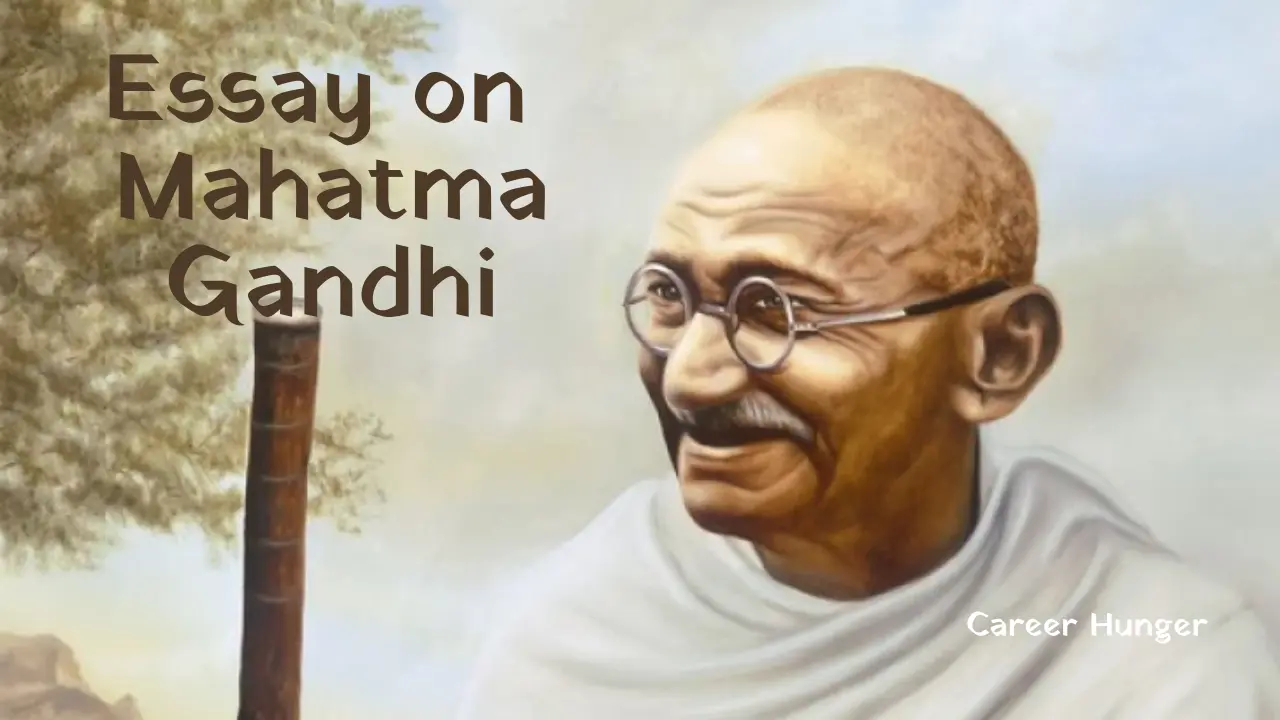
Mahatma Gandhi Essay
Mahatma Gandhi, often referred to as the Father of the Nation in India, remains one of the most iconic figures in the history of the world. His life and principles continue to inspire generations, transcending boundaries of time and geography. From leading India’s struggle for independence through nonviolent resistance to advocating for social justice and communal harmony, Gandhi’s legacy is profound and enduring.
In this blog, we delve into the life, achievements, and impact of Mahatma Gandhi through essays of varying lengths 100, 200, 300, and 500 words. Each essay provides a comprehensive exploration of Gandhi’s early influences, his leadership during India’s independence movement, and his global influence on peace and human rights. We examine his core values of truth, simplicity, and self-discipline, highlighting their relevance in today’s world.
Through these essays, readers will gain insights into Gandhi’s unwavering commitment to nonviolence, his struggles and triumphs, and the lessons his life offers for fostering empathy, tolerance, and sustainable development. Join us on a journey to discover the essence of Mahatma Gandhi’s teachings and their profound impact on shaping a better future for humanity.
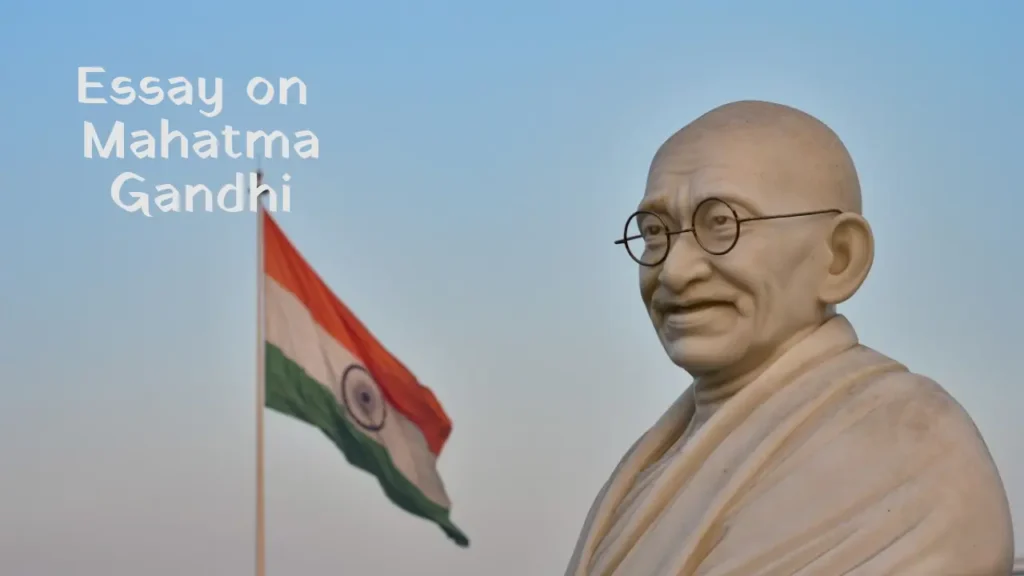
Mahatma Gandhi, a name synonymous with peace, nonviolence, and freedom, played a pivotal role in India’s struggle for independence from British rule. His life and principles continue to inspire people around the world.
Gandhi was born on October 2, 1869, in Porbandar, India. From a young age, he showed a deep compassion for others and a strong sense of justice. He studied law in London and later practiced in South Africa, where he experienced firsthand the discrimination faced by Indians. This experience awakened his sense of duty to fight against injustice.
Gandhi’s philosophy of nonviolence, known as ‘ahimsa,’ became the cornerstone of his struggle for India’s independence. He believed that change could be achieved through peaceful means, without harming others. This idea resonated deeply with millions of Indians who joined him in civil disobedience movements and peaceful protests.
Central to Gandhi’s philosophy were simplicity and truth. He lived a modest life, wearing simple clothes and advocating for self-sufficiency through cottage industries like spinning cloth. His commitment to truth, even in the face of adversity, earned him the title ‘Mahatma,’ which means ‘Great Soul.’
Gandhi’s leadership during India’s freedom struggle was transformative. His Salt March in 1930, where he walked 240 miles to protest against the British salt monopoly, captured the world’s attention. His belief in the dignity of every human being, regardless of their background, inspired unity among Indians of different religions and castes.
Even beyond India, Gandhi’s influence was profound. Leaders like Martin Luther King Jr. in the United States and Nelson Mandela in South Africa were inspired by his principles of nonviolence in their own fights against injustice.
In today’s world, Gandhi’s values of simplicity, truth, and self-discipline remain as relevant as ever. In a world often divided by conflict and inequality, his message of peaceful resistance and respect for all people serves as a powerful example.
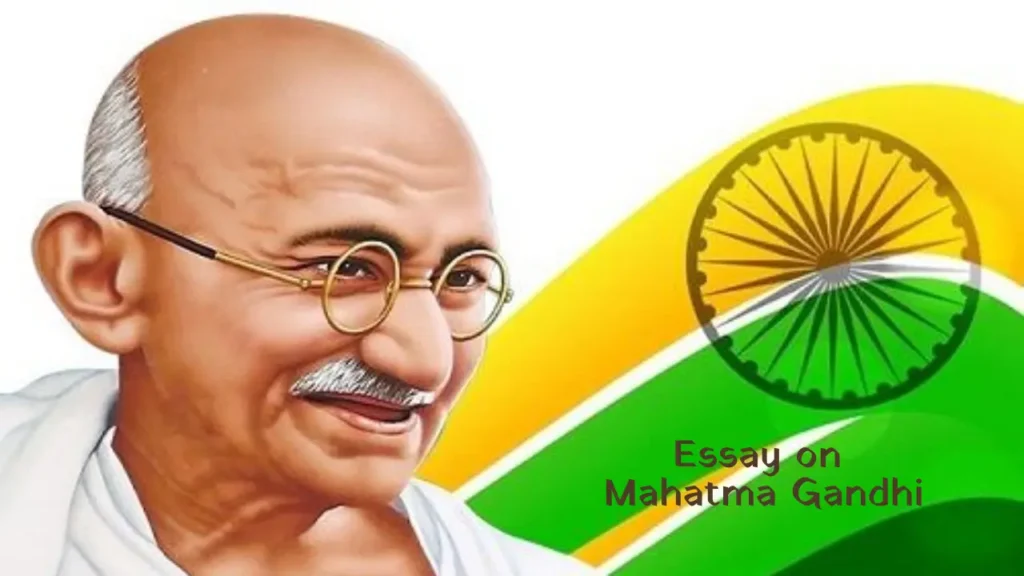
Mahatma Gandhi’s legacy as one of history’s most influential leaders is undeniable. His ability to mobilize people through nonviolent resistance and his unwavering commitment to justice continue to inspire generations. His life teaches us that positive change can be achieved through compassion, perseverance, and the courage to stand up for what is right.
Mahatma Gandhi’s life and teachings remind us that each of us has the power to make a difference in the world. By embracing his principles of nonviolence, truth, and simplicity, we can create a better future for ourselves and for generations to come.
Mahatma Gandhi Essay In 100 Words
Mahatma Gandhi, born in 1869, led India to independence from British rule using nonviolence and civil disobedience. He believed in truth, simplicity, and self-discipline, inspiring millions. Gandhi’s values are timeless truthfulness, living simply, and having self control. Today, these principles help us tackle challenges peacefully and respectfully. Gandhi’s influence extended globally, becoming a symbol of peace and justice. His legacy teaches us to stand up for what’s right and make positive changes in our communities. By following his example, students can learn to lead with kindness, integrity, and courage, creating a better world for everyone.
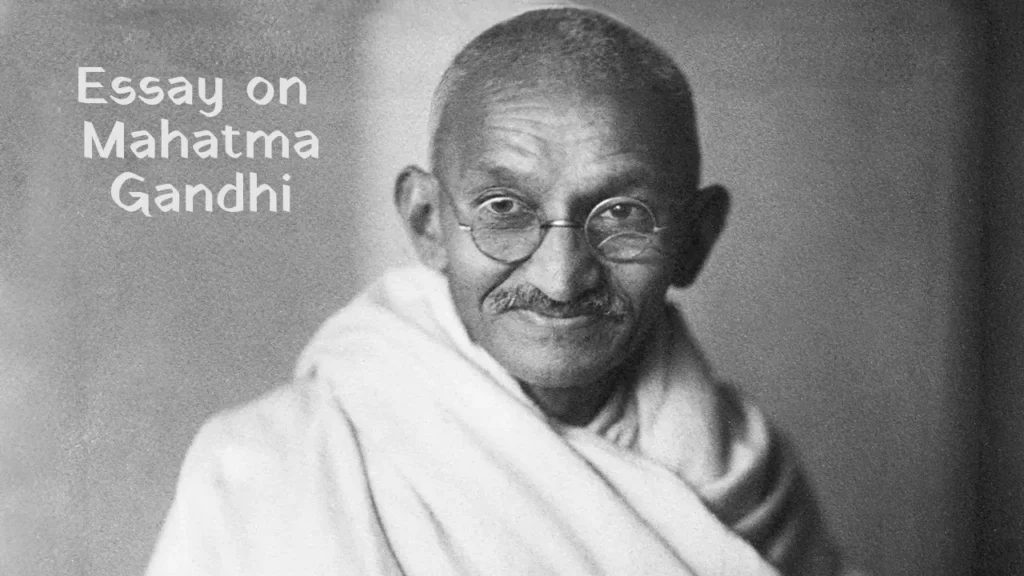
Mahatma Gandhi Essay In 150 Words
Mahatma Gandhi, born in 1869, led India to independence from British rule using nonviolence and civil disobedience. He believed in truth, simplicity, and self discipline, inspiring millions to join him in peaceful protests. Gandhi’s values are timeless truthfulness helps us build trust, simplicity encourages us to live with less, and self-discipline teaches us to control our actions. Today, these principles are crucial for solving conflicts peacefully and respecting others. Gandhi became a global icon for peace and justice, influencing movements around the world. His legacy reminds us to stand up against injustice with courage and kindness. Mahatma Gandhi remains a symbol of hope and change because he showed that one person’s determination can bring freedom and equality. Students can learn from Gandhi’s perseverance and dedication to social justice by embracing compassion, fairness, and the belief that positive change is possible through peaceful means.
Mahatma Gandhi Essay In 200 Words
Mahatma Gandhi, born in 1869, played a crucial role in India’s fight for freedom from British rule. He believed in the power of nonviolent resistance, using peaceful protests and civil disobedience to challenge oppression. Gandhi’s principles of truth, simplicity, and self discipline guided his actions and inspired others to live with honesty, lead a modest life, and practice self-control.
Central to Gandhi’s philosophy was ahimsa, or nonviolence, and satyagraha, which means truth force. These ideas teach us to resolve conflicts peacefully and uphold justice without resorting to aggression. Today, they remain relevant in promoting social harmony and fairness.
Gandhi’s impact extended far beyond India. He became a global advocate for human rights and civil liberties, influencing movements worldwide. His legacy as a symbol of peace and moral integrity continues to inspire leaders and activists to stand up against injustice with empathy and resilience.
Mahatma Gandhi’s life teaches us valuable lessons: to embrace nonviolence, live with integrity, and use peaceful activism to create positive change in our communities and the world.
Mahatma Gandhi Essay In 300 Words
Mahatma Gandhi, born in 1869, emerged as a towering figure in India’s struggle for independence from British rule. His philosophy of nonviolence, or ahimsa, and civil disobedience became powerful tools against injustice and oppression. Gandhi’s core values of truth, simplicity, and self-discipline guided his actions and resonated widely, advocating for living honestly, leading a modest life, and exercising self-control in personal and societal contexts.
Gandhi’s leadership extended beyond India, inspiring global movements for human rights and social justice. His advocacy for peace and harmony among diverse communities left a lasting impact. Notable actions like the Salt March, where he walked 240 miles to protest British salt taxes, symbolized his commitment to civil disobedience and highlighted the power of peaceful protest.
Gandhi’s enduring legacy as a symbol of moral courage and integrity continues to influence leaders and activists worldwide. His teachings remain relevant today, promoting tolerance, empathy, and constructive dialogue in resolving conflicts peacefully.
Mahatma Gandhi’s life teaches us profound lessons: the power of nonviolence in achieving social change, the importance of living with integrity and simplicity, and the impact of individual actions in shaping a better world. Students are encouraged to reflect on how Gandhi’s principles can inspire them to make a positive difference in their own lives and communities, fostering a future built on justice, compassion, and understanding.
Mahatma Gandhi Essay In 500 Words
Mahatma Gandhi, born in 1869 in Porbandar, India, grew up in a devout Hindu family. His early life was marked by a strong sense of justice and a deep compassion for others. After studying law in London, Gandhi practiced in South Africa, where he witnessed firsthand the discrimination faced by Indians. This experience ignited his lifelong commitment to fighting injustice through nonviolent means.
Gandhi’s pivotal role in India’s struggle for independence from British rule began with his advocacy of nonviolent resistance and civil disobedience. He believed in confronting oppression with peaceful protests, such as the Salt March of 1930, where he walked 240 miles to challenge British salt taxes. This act symbolized Gandhi’s belief in self-sufficiency and the power of collective action.
Central to Gandhi’s philosophy were his core values of truth (satya), simplicity (simpla), and self-discipline (tapas). He lived a simple life, wore humble clothes, and practiced celibacy to focus on his mission. Gandhi’s principle of ahimsa, or nonviolence, became a powerful force for social change. It inspired millions in India and around the world to resist injustice peacefully, influencing movements for civil rights, freedom, and equality globally.
Beyond India, Gandhi’s influence extended to leaders like Martin Luther King Jr. in the United States and Nelson Mandela in South Africa, who embraced his methods of nonviolent resistance in their struggles for justice. Gandhi’s efforts also focused on promoting communal harmony and advocating for human rights on an international scale.
Despite facing numerous challenges and imprisonment during his lifetime, Gandhi remained steadfast in his commitment to nonviolence and truth. His teachings on empathy, tolerance, and sustainable development are particularly relevant today. In a world often divided by conflict and inequality, Gandhi’s emphasis on peaceful resolution and respect for all remains a guiding light.
Mahatma Gandhi’s life and teachings continue to inspire us to strive for a better world. His principles of nonviolence, truthfulness, and simplicity remind us of the power of individual actions in bringing about collective change. As students, reflecting on Gandhi’s legacy encourages us to embrace empathy, practice tolerance, and actively contribute to building a society rooted in justice and equality. Gandhi’s life demonstrates that each of us has the potential to make a profound difference through courage, compassion, and unwavering dedication to truth and nonviolence.
Essay on Mahatma Gandhi
Mahatma Gandhi, born on October 2, 1869, in Porbandar, India, was deeply influenced by his upbringing in a devout Hindu family and the teachings of Jainism. He studied law in London and practiced in South Africa, where he experienced racial discrimination. These early experiences shaped his philosophy of nonviolent resistance, or ahimsa, and his commitment to social justice.
Gandhi’s pivotal role in India’s independence movement began with his leadership in advocating for civil rights and challenging British colonial rule through nonviolent means. He emphasized the power of peaceful protests and civil disobedience, famously leading the Salt March in 1930 to protest against British salt taxes. This act galvanized the Indian masses and drew international attention to their plight.
Central to Gandhi’s life were his core values of truth, simplicity, and self-discipline. He lived a simple life, wore traditional Indian clothes, and embraced celibacy as a means of spiritual discipline. These principles guided his personal conduct and leadership style, earning him the title of “Mahatma,” meaning “Great Soul.”
Gandhi’s leadership extended beyond India, influencing global peace movements and inspiring leaders such as Martin Luther King Jr. in the United States and Nelson Mandela in South Africa. His philosophy of nonviolence became a guiding principle for civil rights movements worldwide, emphasizing dignity, equality, and justice for all.
Despite facing imprisonment and numerous challenges, Gandhi remained steadfast in his principles, advocating for communal harmony and social justice. His efforts to bridge religious and caste divides within India underscored his commitment to unity and inclusivity.
Mahatma Gandhi’s legacy as a symbol of moral courage and integrity endures today. His teachings on nonviolence, empathy, and sustainable development remain relevant in fostering peace and harmony in a world often marred by conflict and inequality. Gandhi’s life demonstrates that positive change can be achieved through compassion, perseverance, and a commitment to truth and justice.
Mahatma Gandhi’s life achievements and impact resonate globally as a testament to the power of peaceful activism and the enduring quest for human rights and social justice. His legacy inspires individuals of all ages to embrace empathy, promote tolerance, and work towards a more equitable and harmonious world.

Essay Writing in English | Guide to Writing an Essay

Importance of English Language Essay In English : 100, 200, 300, 500 Words

150+ Happy Marriage Anniversary Wishes

Wedding Anniversary Wishes

101+ Happy Anniversary Wishes for Couples

100+ Anniversary Wishes for your Love💖

Anniversary Wishes For Wife

Heart Touching Anniversary Wishes for Husband
Share this post.
[…] Mahatma Gandhi Essay In English : 100, 200, 300, 500 Words […]
Leave a Comment Cancel reply
Save my name, email, and website in this browser for the next time I comment.
Recent News Articles

- Data Mastery Hub
- Data Insights
- Cloud Engineering
- Web Development
- Computer Graphics
- Interview Questions & Answers
- Interview Excellence Hub
- Resume Guide
- Career Crafters Hub
- Government Jobs
- Scholarships
Quick Links
- Privacy Policy
- Terms of Service
Connect us at
Click and Get started in seconds
All rights reserved by Career Hunger.

Essay on Mahatma Gandhi in English for Children and Students

Table of Contents
Essay on Mahatma Gandhi in English: Mahatma Gandhi was an influential political leader in India who is best known for leading the country’s nonviolent resistance movement against British colonialism. After studying law in England, Gandhi returned to India and became a prominent leader of the Indian National Congress. He advocated for India’s independence from British rule and promoted a philosophy of non-violent resistance. Gandhi was arrested numerous times by the British authorities, but he continued to lead protests and campaigns against British rule. In 1947, India finally achieved independence, and Gandhi played a key role in the country’s transition to democracy. He was assassinated in 1948 by a Hindu extremist.
Fill Out the Form for Expert Academic Guidance!
Please indicate your interest Live Classes Books Test Series Self Learning
Verify OTP Code (required)
I agree to the terms and conditions and privacy policy .
Fill complete details
Target Exam ---
Don’t Miss:
- Gandhi Jayanti Poster
- Gandhi Jayanti Quotes
Below, we have provided simple essays on Mahatma Gandhi, a person who would always live in the heart of the Indian people. Every kid and child of India knows him by the name of Bapu, or Father of the Nation. Using the following Mahatma Gandhi essay, you can help your kids, and school-going children perform better in school during any competition or exam.
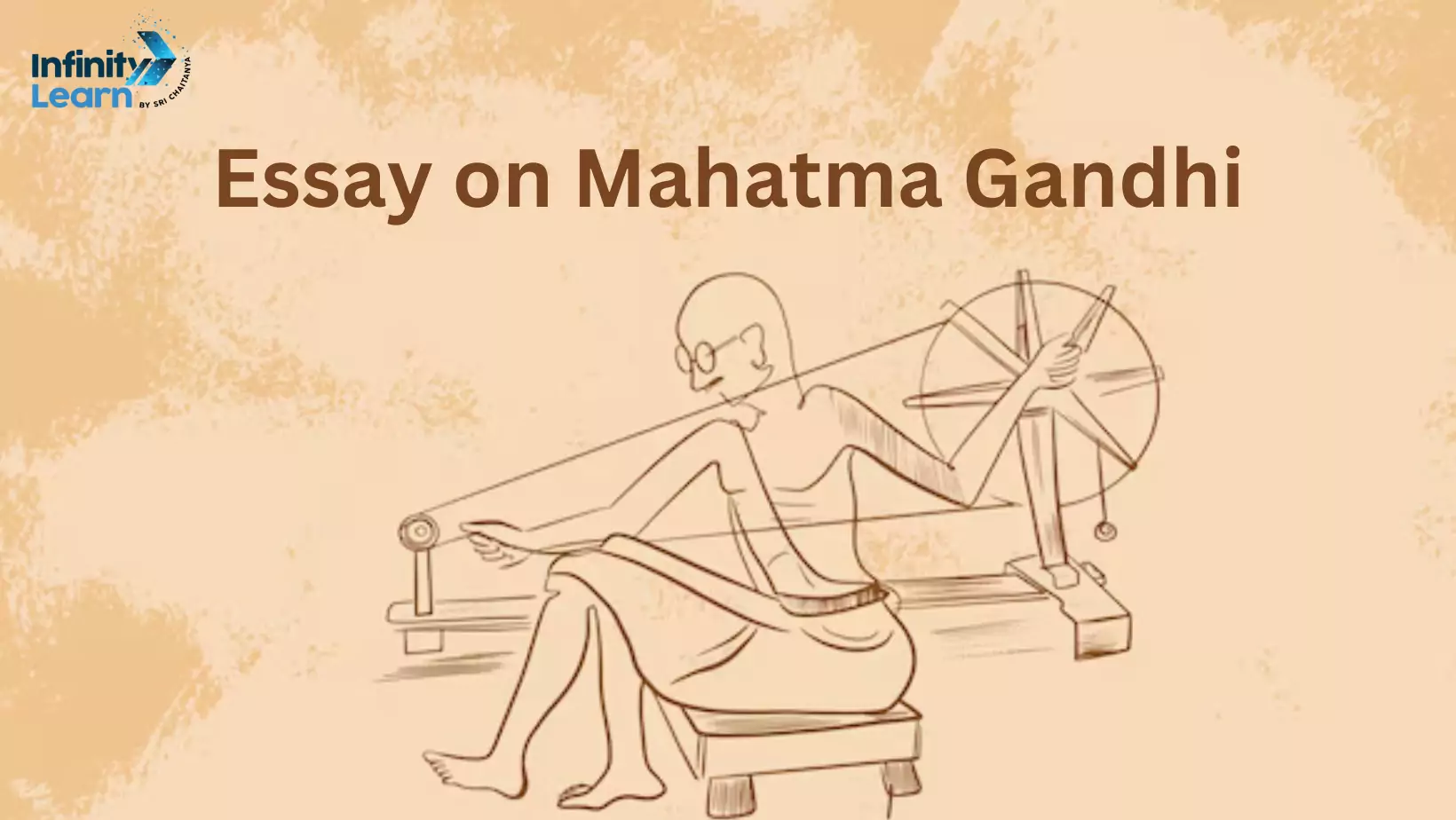
Long and Short Essay on Mahatma Gandhi in English

Below are short and long essays on Mahatma Gandhi in English for your information and knowledge.
The essays have been written in simple yet effective English so that you can quickly grasp and present the information whenever needed.
After going through these Mahatma Gandhi essays, you will learn about the life and ideals of Mahatma Gandhi, the teachings of Mahatma Gandhi, what role he played in the freedom struggle, and why is he the most respected leader in the world over; how his birthday is celebrated, etc.
The information given in the essays will be helpful in speech giving, essay writing, or speech-providing competition on the occasion of Gandhi Jayanti.
Also Read: Independence Day Speech for Students
Mahatma Gandhi Essay 100 Words
Mahatma Gandhi is famous in India as “Bapu” or “Rastrapita.” His full name of him is Mohandas Karamchand Gandhi. He was a great freedom fighter who led India as a leader of nationalism against British rule. He was born on the 2 nd of October in 1869 in Porbandar, Gujarat, India.
He died on the 30 th of January in 1948. M.K. Gandhi was assassinated by the Hindu activist Nathuram Godse, who was hanged later as a punishment by the government of India. Rabindranath Tagore has given him another name, “Martyr of the Nation,” since 1948.

Mahatma Gandhi Essay in 150 Words
Mahatma Gandhi is called Mahatma because of his great works and greatness throughout his life. He was a great freedom fighter and non-violent activist who always followed non-violence throughout his life while leading India to independence from British rule.
He was born on the 2 nd of October 1869 at Porbandar in Gujarat, India. He was just 18 years old while studying law in England. Later he went to the British colony of South Africa to practice his law, where he got differentiated from the light skin people because of being a dark skin person. That’s why he decided to become a political activist to make some positive changes in such unfair laws.
Later he returned to India and started a powerful and non-violent movement to make India an independent country. He was the one who led the Salt March (Namak Satyagrah or Salt Satyagrah or Dandi March) in 1930. He inspired many Indians to work against British rule for their independence.
Also Read: Sant Ravidas Jayanti 2024
Mahatma Gandhi Essay in 200 Words
Mahatma Gandhi was an outstanding personality in India who still inspires the people in the country and abroad through his legacy of greatness, idealness, and dignified life. Bapu was born in a Hindu family in Porbandar, Gujarat, India, on the 2 nd of October in 1869. The 2 nd of October was the great day for India when Bapu took birth. He paid an incredible and unforgettable role in the independence of India from British rule. The full name of the Bapu is Mohandas Karamchand Gandhi. He went to England for his law study just after passing his matriculation examination. Later he returned to India as a lawyer in 1890.
After he arrived in India, he started helping Indian people facing various problems from British rule. He started a Satyagraha movement against the British government to help Indians. Other significant movements initiated by the Bapu for the independence of India are the Non-cooperation movement in 1920, the Civil Dis the obedience movement in 1930, and the Quit India movement in 1942. All the movements had shaken the British rule in India and inspired many everyday Indian citizens to fight for freedom.
Also Read: International Day of Non Violence 2nd October
Mahatma Gandhi Essay in 250 Words
Bapu, Mohandas Karamchand Gandhi, was born 1869 on the 2 nd of October at Porbander in Gujarat, India. Mahatma Gandhi was a great Indian who led India in the independence movement against British rule. He completed his schooling in India and went to England for further study of law. He returned to India as a lawyer and started practicing law. He started helping the people of India who were humiliated and insulted by British rule.
He started the non-violence independence movement to fight against the injustice of Britishers. He was insulted many times but continued his non-violent struggle for the Independence of India. After his return to India, he joined Indian National Congress as a member. He was the great leader of the Indian independence movement who struggled a lot for the freedom of India. As a member of the Indian National Congress, he started independence movements like Non-Cooperation, Civil Disobedience, and later Quit India Movement, which became successful a day and helped India get freedom.
As a great freedom fighter, he got arrested and sent to jail many times, but he continued fighting against British rule for the justice of Indians. He was a great believer in non-violence and unity of people of all religions, which he followed through his struggle for independence. After many battles with many Indians, he finally became successful in making India an independent country on the 15 th of August in 1947. Later he was assassinated in 1948 on the 30 th of January by Nathuram Godse, a Hindu activist.

Mahatma Gandhi Essay in 300 words
Mahatma Gandhi was a great freedom fighter who spent his whole life in a struggle for the independence of India. He was born in an Indian Hindu family on the 2 nd of October in 1869 in Porbander, Gujarat. He lived his whole as a leader of the Indian people. His whole life story is a great inspiration for us. He is called the Bapu or Rashtrapita as he spent his life fighting against British rule for our freedom of us. While fighting with Britishers, he took the help of his great weapons like non-violence and Satyagraha movements to achieve independence. He was arrested and sent to jail many times but never discouraged himself and continued fighting for national freedom.
He is the birth father of our nation who used all his power to make us free from British rule. He understood the power of unity in people (from different castes, religions, communities, races, ages, or gender), which he used throughout his independence movement. Finally, he forced Britishers to quit India forever through his mass movements on the 15 th of August in 1947. Since 1947, India’s 15th of August has been celebrated as Independence Day th of August has been celebrated as Independence Day in India.
He could not continue his life after the independence of India in 1947 as he was assassinated by one of the Hindu activists, Nathuram Godse, in 1948 on the 30 th of January. He was a great personality who served his whole life till death for the motherland. He enlightened our life with the true light of freedom from British rule. He proved that everything is possible with the non-violence and unity of people. Even after dying many years ago, he is still alive in the heart of every Indian as a “Father of the Nation and Bapu.”

Mahatma Gandhi Essay in 400 words
Mahatma Gandhi is well known as the “Father of the Nation or Bapu” because of his most significant contributions toward our country’s independence. He was the one who believed in the non-violence and unity of the people and brought spirituality to Indian politics. He worked hard the remove the untouchability in the Indian society , upliftment of the backward classes in India, raised his voice to develop villages for social development, and inspired Indian people to use swadeshi goods and other social issues. He brought familiar people in front to participate in the national movement and encouraged them to fight for their actual freedom.
He was one of the persons who converted people’s dream of independence into truth day through his noble ideals and supreme sacrifices. He is remembered for his wondrous works and primary virtues such as non-violence, truth, love, and fraternity. He was not born as excellent, but he made himself great through his hard struggles and work. The life of King Harischandra highly influenced him from the play titled Raja Harischandra. After schooling, he completed his law degree in England and began his career as a lawyer. He faced many difficulties in his life but continued walking as a great leader.
He started many mass movements like the Non-cooperation movement in 1920, the civil disobedience movement in 1930, and finally the Quit India Movement in 1942, throughout the way to independence of India. After many struggles and work, the British Government finally granted independence to India. He was a straightforward person who worked to remove the color barrier and caste barrier. He also worked hard to remove the untouchability in the Indian society and named untouchables as “Harijan” means the people of God.
He was a great social reformer and Indian freedom fighter who died a day after completing his aim of life. He inspired Indian people for the manual labour and said that arrange all the resource ownself for living a simple life and becoming self-dependent. He started weaving cotton clothes through the use of Charakha in order to avoid the use of videshi goods and promote the use of Swadeshi goods among Indians.
He was a strong supporter of the agriculture and motivated people to do agriculture works. He was a spiritual man who brought spirituality to the Indian politics. He died in 1948 on 30 th of January and his body was cremated at Raj Ghat, New Delhi. 30 th of January is celebrated every year as the Martyr Day in India in order to pay homage to him.
Essay on Non-violence of Mahatma Gandhi – Essay in 800 Words
Non-violence or ‘ahimsa’ is a practice of not hurting anyone intentionally or unintentionally. It is the practice professed by great saints like Gautam Buddha and Mahaveer. Mahatma Gandhi was one of the pioneer personalities to practice non-violence. He used non-violence as a weapon to fight the armed forces of the British Empire and helped us to get independence without lifting a single weapon.
Role of Non-violence in Indian Freedom Struggle
The role of non-violence in the Indian freedom struggle became prominent after the involvement of Mahatma Gandhi. There were many violent freedom struggles going on concurrently in the country and the importance of these cannot be neglected either. There were many sacrifices made by our freedom fighters battling against the British rule. But non-violence was a protest which was done in a very peaceful manner and was a great way to demand for the complete independence. Mahatma Gandhi used non-violence in every movement against British rule. The most important non-violence movements of Mahatma Gandhi which helped to shake the foundation of the British government are as follows.
Champaran and Kheda Agitations
In 1917 the farmers of Champaran were forced by the Britishers to grow indigo and again sell them at very cheap fixed prices. Mahatma Gandhi organized a non-violent protest against this practice and Britishers were forced to accept the demand of the farmers.
Kheda village was hit by floods in 1918 and created a major famine in the region. The Britishers were not ready to provide any concessions or relief in the taxes. Gandhiji organized a non-cooperation movement and led peaceful protests against the British administration for many months. Ultimately the administration was forced to provide relief in taxes and temporarily suspended the collection of revenue.
Non-cooperation Movement
The Jallianwala Bagh massacre and the harsh British policies lead to the Non-cooperation movement in 1920. It was the non-violence protest against the British rule. Gandhiji believed that the main reason of the Britishers flourishing in India is the support they are getting from Indians. He pleaded to boycott the use of British products and promoted the use of ‘Swadeshi’ products. Indians denied working for the Britishers and withdrew themselves from the British schools, civil services, government jobs etc. People started resigning from the prominent posts which highly affected the British administration. The Non-Cooperation movement shook the foundation of the British rule and all these without a single use of any weapon. The power of non-violence was more evident in the non-cooperation movement.
Salt Satyagrah or Salt March
Salt March or the ‘Namak Satyagrah’ was the non-violence movement led by Mahatma Gandhi against the salt monopoly of the Britishers. Britishers imposed a heavy taxation on the salt produce which affected the local salt production. Gandhiji started the 26 days non-violence march to Dandi village, Gujarat protesting against the salt monopoly of the British government. The Dandi march was started on 12 th March 1930 from Sabarmati Ashram and ended on 06 th April 1930 at Dandi, breaking the salt laws of the British government and starting the local production of salt. The Salt March was a non violent movement which got the international attention and which helped to concrete the foundation of Independent India.
Quit India Movement
After the successful movement of the Salt March, the foundation of British government shook completely. Quit India Movement was launched by Mahatma Gandhi on 8 th August 1942 which demanded the Britishers to quit India. It was the time of World War II when Britain was already in war with Germany and the Quit India Movement acted as a fuel in the fire. There was a mass non-violent civil disobedience launched across the country and Indians also demanded their separation from World War II. The effect of Quit India Movement was so intense that British government agreed to provide complete independence to India once the war gets over. The Quit India Movement was a final nail in the coffin of the British rule in India.
These movements led by Mahatma Gandhi were completely Non-violent and did not use any weapon. The power of truth and non-violence were the weapons used to fight the British rule. The effect of non-violence was so intense that it gained the immediate attention of the international community towards the Indian independence struggle. It helped to reveal the harsh policies and acts of the British rule to the international audience.
Mahatma Gandhi always believed that weapons are not the only answer for any problem; in fact they created more problems than they solved. It is a tool which spreads hatred, fear and anger. Non-violence is one of the best methods by which we can fight with much powerful enemies, without holding a single weapon. Apart from the independence struggle; there are many incidents of modern times which exhibited the importance of non-violence and how it helped in bringing changes in the society and all that without spilling a single drop of blood. Hope the day is not very far when there will be no violence and every conflict and dispute will be solved through peaceful dialogues without harming anyone and shedding blood and this would be a greatest tribute to Mahatma Gandhi.
Long Essay on Mahatma Gandhi – Essay in 1100 Words
Mohandas Karamchand Gandhi aka ‘Mahatma Gandhi’ was one of the great sons of Indian soil who rose to become a great soul and gave major contribution in the great Indian freedom struggle against the British rule in India. He was a man of ideologies and a man with great patience and courage. His non-violence movements involved peaceful protests and non-cooperation with the British rule. These movements had a long term effects on the Britishers and it also helped India to grab the eye balls of global leaders and attracted the attention on the international platforms.
Family and Life of Mahatma Gandhi
- Birth and Childhood
Mahatma Gandhi was born as Mohandas Karamchand Gandhi on 02 nd October, 1869 at Porbandar (which is in the current state of Gujarat). His father Karamchand Gandhi was working as the Chief Minister (diwan) of Porbandar at that time. His mother Putlibai was a very devotional and generous lady. Young Gandhi was a reflection of his mother and inherited high values, ethics and the feeling of sacrifice from her.
- Marriage and Education
Mohandas was married to Kasturba Makanji at a very young age of 13. In 1888, they were blessed with a baby boy and after which he sailed to London for higher studies. In 1893, he went to South Africa to continue his practice of law where he faced strong racial discrimination by the Britishers. The major incident which completely changed the young Gandhi was when he was forcibly removed from the first class compartment of a train due to his race and color.
- Civil Rights Movement in Africa
After the discrimination and embracement faced by Gandhi due to his race and color, he vowed to fight and challenge the racial discrimination of immigrants in South Africa. He formed Natal Indian Congress in 1894 and started fighting against racial discrimination. He fought for the civil rights of the immigrants in South Africa and spent around 21 years there.
- Mahatma Gandhi in the Indian Freedom Struggle
Gandhi returned to India in 1915 and joined Indian National Congress and started to raise voice against the British rule in India and demanded the complete independence or ‘Purn Swaraj’ for India. He started many non-violent movements and protests against Britishers and was also imprisoned various times in his long quest of freedom. His campaigns were completely non-violent without the involvement of any force or weapons. His ideology of ‘ahimsa’ meaning not to injure anyone was highly appreciated and was also followed by many great personalities around the globe.
Why was Gandhi called Mahatma?
‘Mahatma’ is a Sanskrit word which means ‘great soul’. It is said that it was Rabindranth Tagore who first used ‘Mahatma’ for Gandhi. It was because of the great thoughts and ideologies of Gandhi which made people honour him by calling ‘Mahatma Gandhi’. The great feeling of sacrifice, love and help he showed throughout his life was a matter of great respect for each citizen of India.
Mahatma Gandhi showed a lifelong compassion towards the people affected with leprosy. He used to nurse the wounds of people with leprosy and take proper care of them. In the times when people used to ignore and discriminate people with leprosy, the humanitarian compassion of Gandhi towards them made him a person with great feelings and a person with great soul justifying himself as Mahatma.
Mahatma Gandhi’s contribution on various social issues could never be ignored. His campaign against untouchability during his imprisonment in the Yerwada Jail where he went on fast against the age old evil of untouchability in the society had highly helped the upliftment of the community in the modern era. Apart from this, he also advocated the importance of education, cleanliness, health and equality in the society. All these qualities made him a man with great soul and justify his journey from Gandhi to Mahatma.
What are Gandhi’s accomplishments?
Mahatma Gandhi was a man with mission who not only fought for the country’s independence but also gave his valuable contribution in uprooting various evils of the society. The accomplishments of Mahatma Gandhi is summarized below:
Fought against Racial Discrimination in South Africa
The racial discrimination in South Africa shocked Mahatma Gandhi and he vowed to fight against it. He challenged the law which denied the voting rights of the people not belonging to the European region. He continued to fight for the civil rights of the immigrants in South Africa and became a prominent face of a civil right activist.
Face of the Indian Freedom Struggle
Mahatma Gandhi was the liberal face of independence struggle. He challenged the British rule in India through his peaceful and non-violent protests. The Champaran Satyagrah, Civil Disobedience Movement, Salt March, Quit India Movement etc are just the few non-violent movements led by him which shook the foundation of the Britishers in India and grabbed the attention of the global audience to the Indian freedom struggle.
Uprooting the Evils of Society
Gandhi Ji also worked on uprooting various social evils in the society which prevailed at that time. He launched many campaigns to provide equal rights to the untouchables and improve their status in the society. He also worked on the women empowerment, education and opposed child marriage which had a long term effect on the Indian society.
What was Gandhi famous for?
Mahatma Gandhi was one of the great personalities of India. He was a man with simplicity and great ideologies. His non-violent way to fight a much powerful enemy without the use of a weapon or shedding a single drop of blood surprised the whole world. His patience, courage and disciplined life made him popular and attracted people from every corners of the world.
He was the man who majorly contributed in the independence of India from the British rule. He devoted his whole life for the country and its people. He was the face of the Indian leadership on international platform. He was the man with ethics, values and discipline which inspires the young generation around the globe even in the modern era.
Gandhi Ji was also famous for his strict discipline. He always professed the importance of self discipline in life. He believed that it helps to achieve bigger goals and the graces of ahimsa could only be achieved through hard discipline.
These qualities of the great leader made him famous not only in India but also across the world and inspired global personalities like Nelson Mandela and Martin Luther King.
Mahatma Gandhi helped India to fulfill her dream of achieving ‘Purna Swaraj’ or complete independence and gave the country a global recognition. Though he left this world on 30 th January, 1948, but his ideologies and thoughts still prevail in the minds of his followers and act as a guiding light to lead their lives. He proved that everything is possible in the world if you have a strong will, courage and determination.
Get More Information About Mahatma Gandhi and his involvement
FAQs on Mahatma Gandhi
Why is gandhi jayanti celebrated.
Gandhi Jayanti is celebrated to honor the birthday of Mahatma Gandhi, who led India’s fight for independence through non-violence.
What happened on October 2 Gandhi Jayanti?
On October 2, Gandhi Jayanti, people remember Gandhi's teachings and contributions to India's freedom movement.
Why did Mahatma Gandhi die?
Mahatma Gandhi died because he was assassinated by Nathuram Godse on January 30, 1948, due to his beliefs in peace and tolerance.
What activities can be done on Gandhi Jayanti?
On Gandhi Jayanti, people participate in prayer meetings, cleanliness drives, and cultural programs to promote his values.
What was the activity of Mahatma Gandhi?
Mahatma Gandhi was active in promoting non-violent protests, civil rights, and social reforms in India.
How do you celebrate Gandhi Jayanti?
People celebrate Gandhi Jayanti by attending memorial services, singing hymns, and discussing Gandhi’s ideals.
How many years completed Gandhi Jayanti?
As of 2023, Gandhi Jayanti has been celebrated for 154 years since his birth in 1869.
In which year was the 150th anniversary of Mahatma Gandhi?
The 150th anniversary of Mahatma Gandhi was celebrated in 2019.
What is a good message for Gandhi Jayanti?
A good message for Gandhi Jayanti is to promote peace, love, and non-violence in our lives.
What is the slogan of Gandhi Jayanti?
A common slogan for Gandhi Jayanti is 'Be the change you wish to see in the world.'
How to write 10 lines on Mahatma Gandhi?
Write about his role in India's freedom, his non-violence principles, and key events in his life.
Who was Mahatma Gandhi short note?
Mahatma Gandhi was a leader who fought for India's freedom using non-violent methods.
Is Mahatma Gandhi a freedom fighter?
Yes, Mahatma Gandhi was a key leader in India's struggle for independence.
Who is Mahatma Gandhi Class 8?
Mahatma Gandhi is taught as a major leader who used non-violence to gain India's freedom.
What are the 5 lines about Gandhi?
Gandhi led India to freedom, promoted non-violence, fought for social reforms, inspired millions, and was called the Father of the Nation.
Who was Mahatma Gandhi a very short note?
Mahatma Gandhi was a freedom fighter who led India to independence through peaceful means.
What is the essay of Mahatma Gandhi?
An essay on Mahatma Gandhi describes his life, his principles of non-violence, and his role in India's freedom struggle.
Related content

Get access to free Mock Test and Master Class
Register to Get Free Mock Test and Study Material
Offer Ends in 5:00
Select your Course
Please select class.

Question and Answer forum for K12 Students

Mahatma Gandhi Essay | Essay on Mahatma Gandhi for Students and Children in English
Mahatma Gandhi Essay: It wouldn’t be difficult for anyone to identify the great yet humble personality of Mahatma Gandhi. The man who faced one of the world’s biggest superpowers, the British Raj with daunting courage and perseverance through his principle of non-violence, was indeed a force to reckon with. – The Angel of ‘Ahimsa’
You can read more Essay Writing about articles, events, people, sports, technology many more.
Long and Short Essays on Mahatma Gandhi for Kids and Students in English
Given below are two essays in English for students and children about the topic of ‘Mahatma Gandhi’ in both long and short form. The first essay is a long essay on Mahatma Gandhi of 400-500 words. This long essay about Mahatma Gandhi is suitable for students of class 7, 8, 9 and 10, and also for competitive exam aspirants. The second essay is a short essay on Mahatma Gandhi of 150-200 words. These are suitable for students and children in class 6 and below.
Long Essay on Mahatma Gandhi 500 Words in English
Below we have given a long essay on Mahatma Gandhi of 500 words is helpful for classes 7, 8, 9 and 10 and Competitive Exam Aspirants. This long essay on the topic is suitable for students of class 7 to class 10, and also for competitive exam aspirants.
Mohandas Karamchand Gandhi was born on 2nd October, 1869, at Porbandar, a small town on the Western coast of India, which was then one of the many tiny states in Kathiawar. He was born in a middle class family of Vaishya caste. His grandfather had risen to become the Prime Minister of Porbandar and was succeeded by his son Karamchand who was the father of Mohandas. Putlibai, Mohandas’s mother was a saintly character, gentle and devout and left a deep impression on her son’s mind. She was Karam Chand’s fourth wife, the first three having died in childbirth. Mohandas went to an elementary school in Porbandar, where he found it difficult to master the multiplication tables. He had two brothers and a sister and was youngest of all.
He was seven when his family moved to Rajkot. There he attended a primary school and later joined a high school. Though conscientious, he was a ‘mediocre student’ and was excessively shy and timid. The stories of Shravan and Raja Harishchandra had a great impact on him. While he was still in high school, he was married, at the age of 13, to Kasturba who was also of the same age. A friend of the family suggested that if the young Gandhi hoped to take his father’s place in the state service, he had better become a barrister, which he could do in England in 3 years. Gandhi jumped at the idea. The mother’s objection to his going abroad was overcome by the son’s solemn vow not to touch wine, women and meat.
Gandhi went to Bombay to take the ship for England. In Bombay, the people of his caste, who looked upon crossing the ocean as contamination, threatened to excommunicate him if he persisted in going abroad. But Gandhi was adamant and was thus, formally excommunicated by his caste. Undeterred, he sailed on 4th September, 1888, for Southampton at the age of 18.
Having passed his examination, Gandhi was called to the Bar on 10th June, 1891 and sailed for India two days later. When he reached Bombay, he learnt to his profound sorrow that his mother had died. The news had been deliberately kept back from him to spare him from the shock in a distant land.
An offer from Dada Abdulla and Co. to proceed to South Africa on their behalf to instruct their counsel in a lawsuit, was a God-sent opportunity to young Gandhi, Gandhi jumped at it and sailed for South Africa in April 1893. It was in South Africa that this shy timid youth of 24, inexperienced, unaided, alone, came into clash with forces that obliged him to tap his hidden moral resources and turn misfortunes into creative spiritual experiences. After about a week’s stay in Durban, Gandhi left for Pretoria, the capital of the Transvaal, where his presence was needed in connection with a lawsuit.
A first class ticket was purchased for him by his client. When the train reached Maritzburg, the capital of Natal, at about 9 pm, a white passenger who boarded the train objected to the presence of a coloured man in the compartment and Gandhi was ordered by a railway official to shift to a third class. When he refused to do so, a constable pushed him out and his luggage was taken away by the railway authorities. It was winter and bitterly cold. This was the turning point in Gandhi’s life.
He extended his stay in South Africa to protest against the bill that denied Indians the right to vote. In 1910s, he established the Tolstoy farm for peaceful resistance. After the rights of the blacks were restored, Gandhi was hailed as a hero.
In January 1915, he finally returned to India, Mahatma, with no possessions and with only one ambition to serve his people.
At the end of his year’s wanderings, Gandhi settled down on the bank of the river Sabarmati, on the outskirts of Ahmedabad, where he founded an Ashram in May 1915. He called it the ‘Satyagraha Ashram.’ The inmates, about 25 men and women, took the vows of truth, ahimsa, celibacy, non-stealing, non-possession and control of the palate and dedicated themselves to the service of the people.
It was the Rowlatt Act with its denial of civil liberties which finally brought Gandhi into active Indian politics. From 1919 to his death in 1948 he occupied the centre stage of the Indian politics and was the hero of the great historical drama which
culminated in the independence of our country. Like a magician, Gandhi roused a storm of enthusiasm in the country with his call for non-cooperation. He began the campaign by returning to the Viceroy, the medals and decorations he had received from the government for his war services and humanitarian works.
The anti-climax came suddenly in February 1922. An outbreak of mob violence in Chauri-Chaura shocked and pained Gandhi that he refused to continue the campaign and undertook a fast for five days to amne for a crime committed by others in a state of mob hysteria.
On 12th March, 1930, after having duly informed the Viceroy, Gandhi, followed by 78 members of his ashram, both men and women, began his historic 24 day march to the sea beach at Dandi to break the law which had deprived the poor man of his right to make his own salt. The rest is history how a single man shook the foundations of the British Empire and how at his single call the entire nation rose from slumbers to fight for their rights unanimously, forgetting all their differences. In 1942, he launched the Quit India Movement with the slogan ‘Do or Die’.
“An eye for an eye only ends up making the whole world blind.” -Gandhiji

Short Essay on Mahatma Gandhi 200 Words in English
Below we have given a short essay on Mahatma Gandhi is for Classes 1, 2, 3, 4, 5 and 6. This short essay on the topic is suitable for students of class 6 and below.
On 15th August, 1947, India was partitioned and became free. Gandhi declined to attend the celebrations in the capital and went to Calcutta where communal riots were still raging. And then, on the day of independence, a miracle happened. A year old riot stopped as if by magic and Hindus and Muslims began to fraternise with one another. Gandhi spent the day in fast and prayer.
Unfortunately the communal frenzy broke loose again on 31 st August, and while he was staying in a Muslim house, the safety of his own life was threatened. On the following day, he went on a fast which was ‘to end if and only if sanity returns to Calcutta’. The effect was magical. Those who had indulged in loot, arson and murder amidst shouts of glee, came and knelt beside him and begged for forgiveness.
On 4th September, the leaders of all communities in the city brought him a signed pledge that Calcutta would see no more of such outrages. Then, Gandhi broke the fast. Calcutta kept the pledge even when many other cities were plunged in violence in the wake of partition. On 30th January 1948, ten days after the bomb incident, Gandhi hurriedly went up the few steps of the prayer ground in the large park of the Birla House. He had been delayed due to a meeting with the Deputy Prime Minister, Sardar Vallabhbhai Patel and was late by a few minutes.
He loved punctuality and was worried that he had kept the congregation waiting. ‘I am late by ten minutes, he murmured. ‘I should have been here at the stroke of five’. He raised his hands and touched the palms together to greet the crowd that was waiting. Everyone returned the greeting. Many came forward wanting to touch his feet.
They were not allowed to do so, as Gandhi was already late. But a young Hindu from Poona forced his way forward and while seeming to do obeisance fired three point blank shots from a small automatic pistol aimed at the heart. Gandhi fell, his lips uttering the name of God (Hey Ram). Before medical aid could arrive the heart had ceased to beat-the heart that had beat only in love for humanity had ‘stopped’. Thus, died the Mahatma, at the hands of one of his own people, to the eternal glory of what he had lived for and to the eternal shame of those who failed to understand that he was the best representative of the religion for which he suffered martyrdom.
The nation’s feeling was best expressed by Prime Minister Nehru when with a trembling voice and a heart full of grief, he gave the news to the people on the radio.
“The light has gone out of our lives and there is darkness everywhere”.
He was fondly called ‘Bapu’ and is the Father of the Nation. His birthday is a national holiday. His image appears on Indian currency notes. His death day is observed as Martyr’s day. For some, he was a saint or ‘fakir’, some called him a ‘leader’ and some a politician. But, he was in reality an extraordinary soul in an ordinary mortal’s body. That’s why he was called ‘Mahatma’.
Mahatma Gandhi Essay Word Meanings for Simple Understanding
- Bespectacled – wearing eyeglasses
- Agile – quick and well-coordinated in movement
- Daunting – to lessen the courage of, dishearten
- Conscientious – careful and painstaking, meticulous
- Docile – obedient
- Excommunicate – to exclude or expel from membership or participation in any group, association, etc
- Undeterred – persevering with something despite setbacks
- Profound – intense
- Intrigue – a plot of crafty dealing
- Lawsuit – a case in a court of law involving a claim, complaint, etc., by one party against another, suit at law
- Intelligentsia – intellectuals considered as a group or class, especially as a cultural, social, or political elite
- Palate – the sense of taste
- Atone – to make amends for an offense or crime
- Fraternise – to associate in a fraternal or friendly way
- Arson – the act of intentionally or recklessly setting fire to another’s property or to one’s own property for some improper reason
- Congregation – a gathered or assembled body
- Obeisance – deference or homage

IMAGES
VIDEO
COMMENTS
Mahatma Gandhi Essay in English 150 Words. Mahatma Gandhi was a great leader. His full name was Mohandas and Gandhi. He was born on October 2, 1869 at Porbandar. His father was a Diwan. He was an average student. He went to England and returned as a barrister. In South Africa, Gandhiji saw the bad condition of the Indians.
Mahatma Gandhi Paragraph in English – 150 Words for Class 4, 5, 6 School Children. Gandhiji was married to Kasturba Manji. His marriage took place at a very young age of 13. It was the norm of the society then. Mohandas and Kasturba gave birth to a baby boy in the year of 1888. Mahatma Gandhi continued his education and went to South Africa.
Essay on Mahatma Gandhi in 150 Words Introduction. Mahatma Gandhi, a towering figure in India’s history, was born on October 2, 1869, in Porbandar, Gujarat. He spearheaded India’s independence movement through nonviolent civil disobedience, inspiring millions worldwide.
Essay on Mahatma Gandhi in English- 150 words. Mahatma Gandhi was an influential political leader in India who is best known for leading the country’s non-violent resistance movement against British colonialism. In this essay, we will explore some of Gandhi’s life and accomplishments. Gandhi was born in 1869 in what is now Gujarat, India.
Essay on Mahatma Gandhi 150 Words. Born in Porbandar, India, on October 2, 1869, Mahatma Gandhi played a crucial role in India’s fight for independence and gained global recognition for promoting nonviolent resistance.
When asked to write a short essay on Mahatma Gandhi, students can list the highlights they remember about Gandhiji’s life and weave them into a paragraph. Here is a sample essay on Mahatma Gandhi in 150 to 200 words:
Essay on Mahatma Gandhi in 150 Words Mahatma Gandhi’s journey from South Africa to leading India’s independence movement epitomizes his commitment to nonviolent resistance. His philosophy of ahimsa, or nonviolence, and satyagraha, the pursuit of truth-force, became guiding principles.
Each essay provides a comprehensive exploration of Gandhi’s early influences, his leadership during India’s independence movement, and his global influence on peace and human rights. We examine his core values of truth, simplicity, and self-discipline, highlighting their relevance in today’s world.
Mahatma Gandhi Essay in 150 Words. Mahatma Gandhi is called Mahatma because of his great works and greatness throughout his life. He was a great freedom fighter and non-violent activist who always followed non-violence throughout his life while leading India to independence from British rule.
The first essay is a long essay on Mahatma Gandhi of 400-500 words. This long essay about Mahatma Gandhi is suitable for students of class 7, 8, 9 and 10, and also for competitive exam aspirants. The second essay is a short essay on Mahatma Gandhi of 150-200 words.